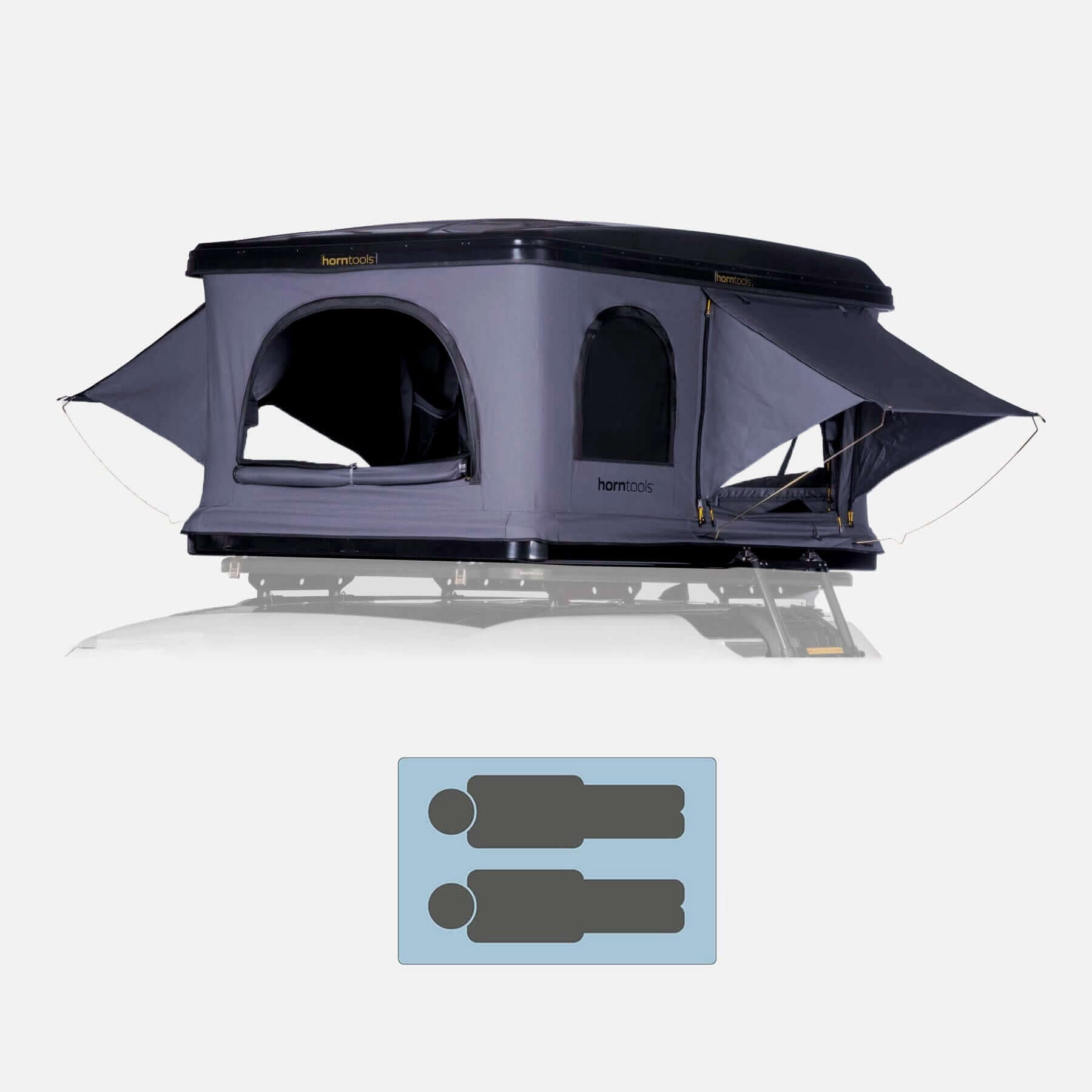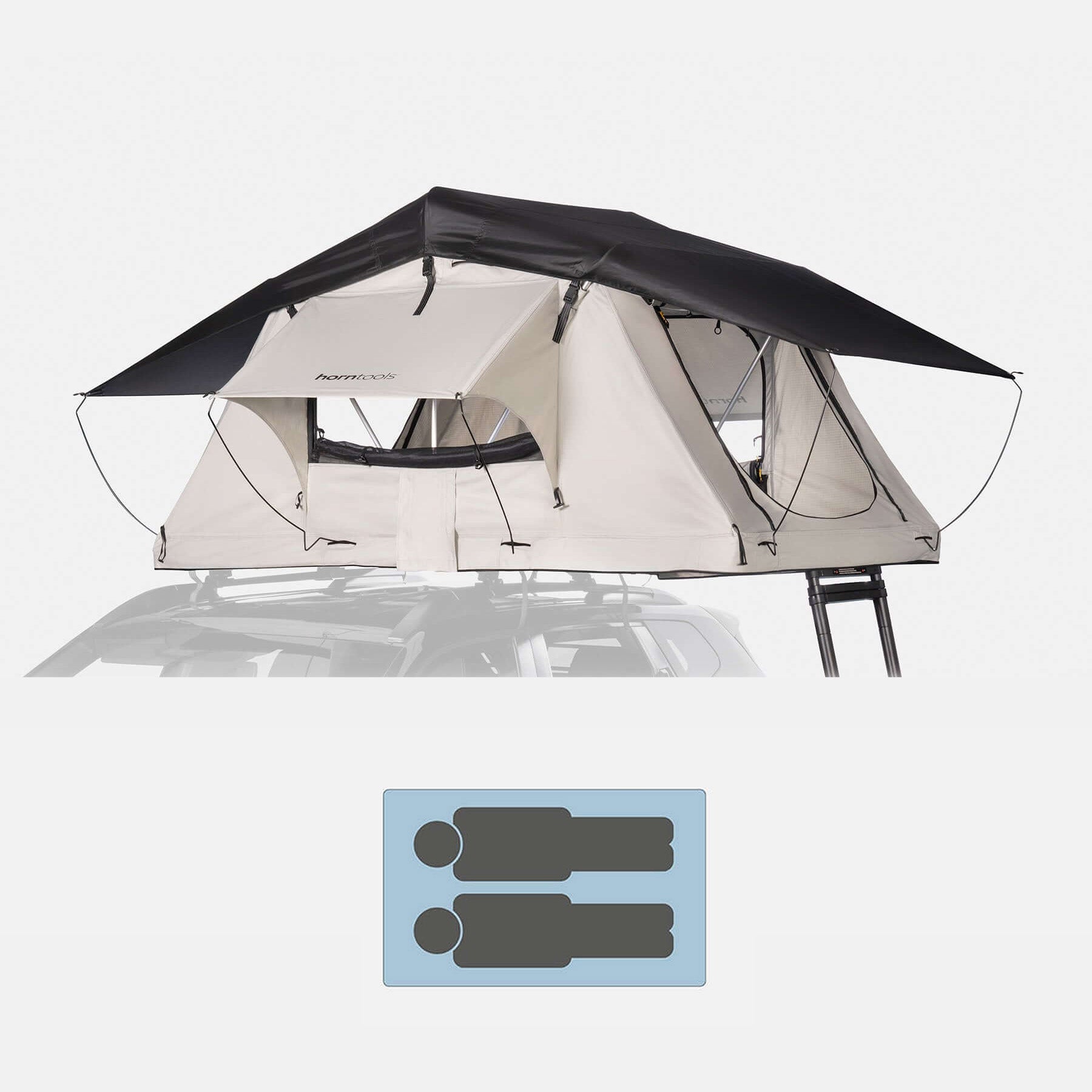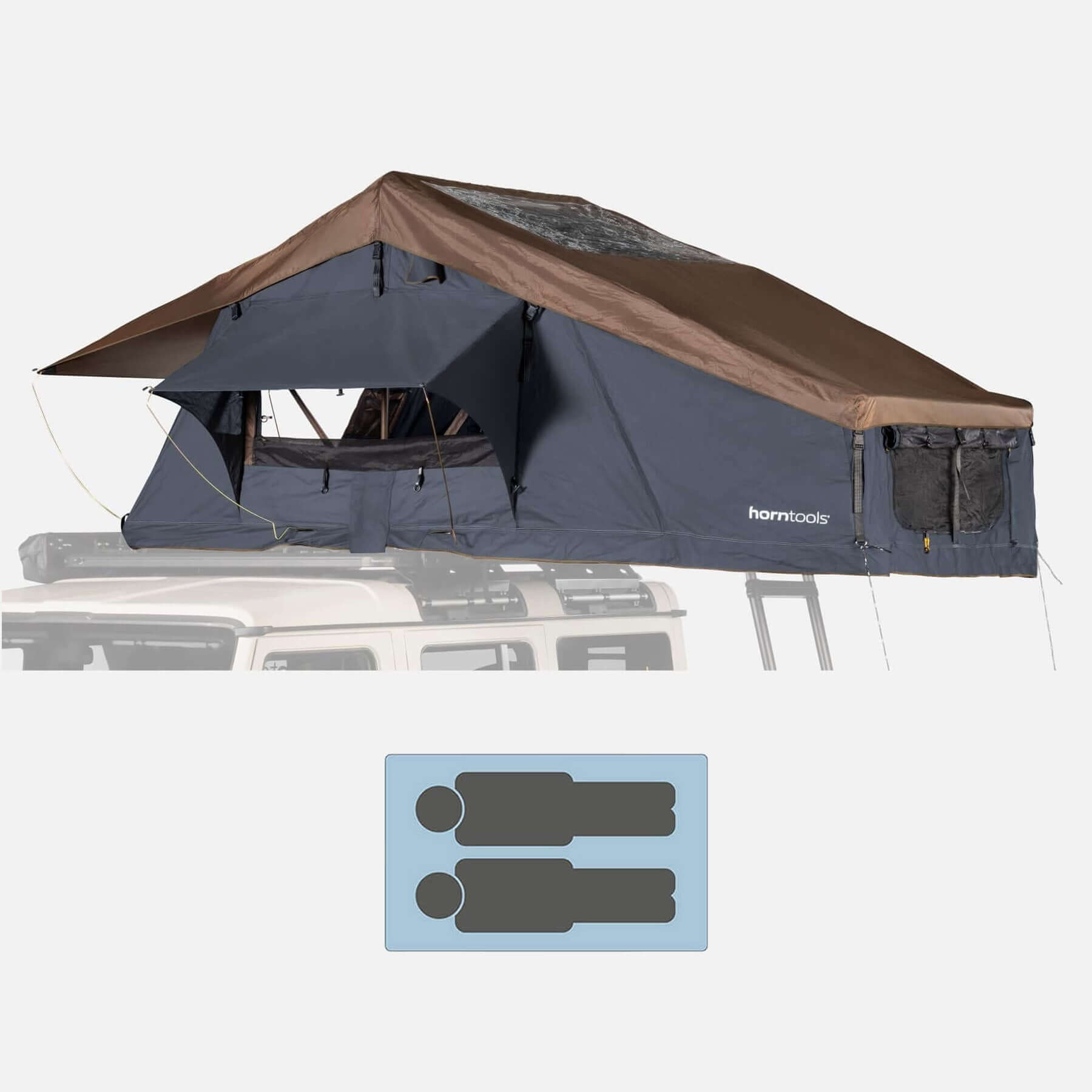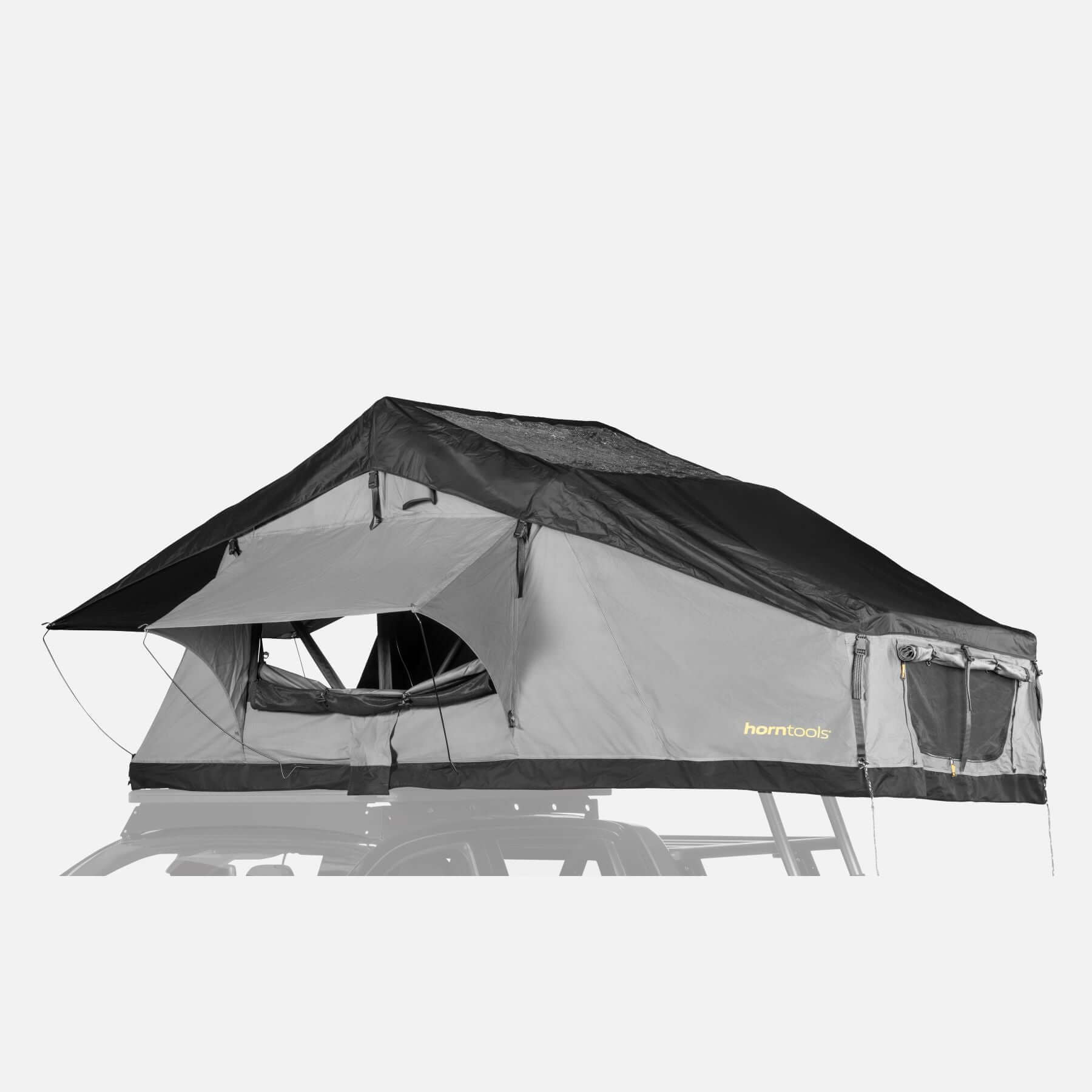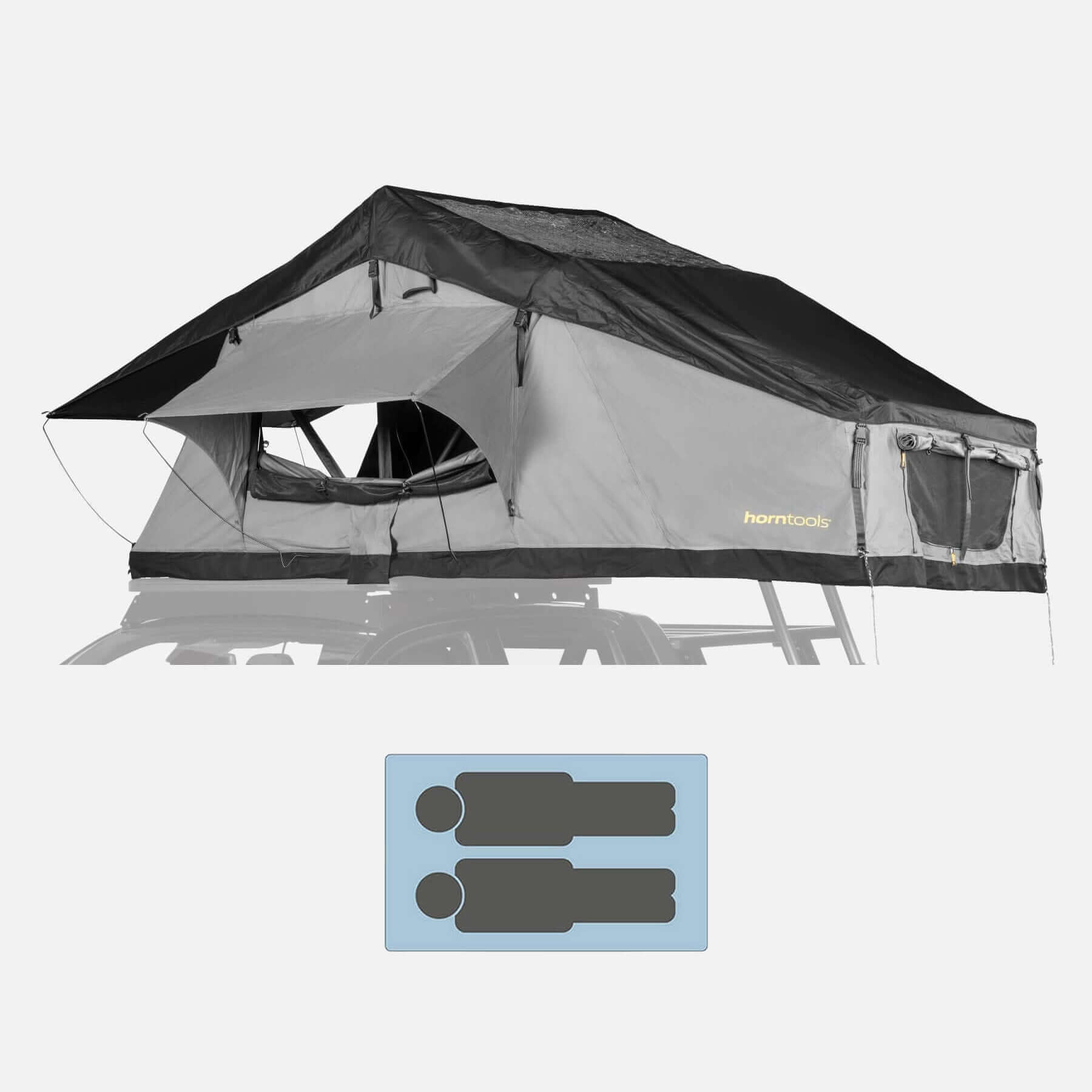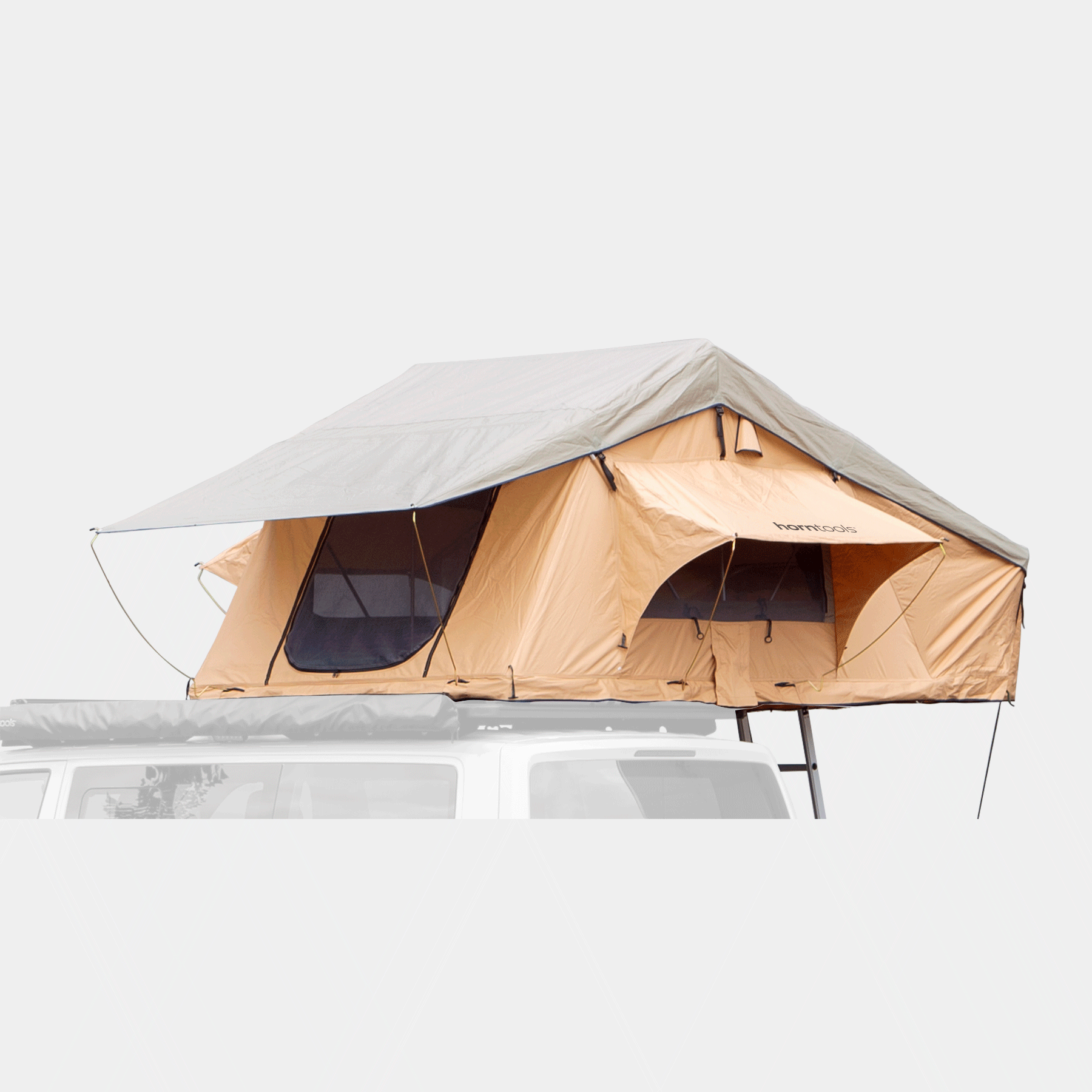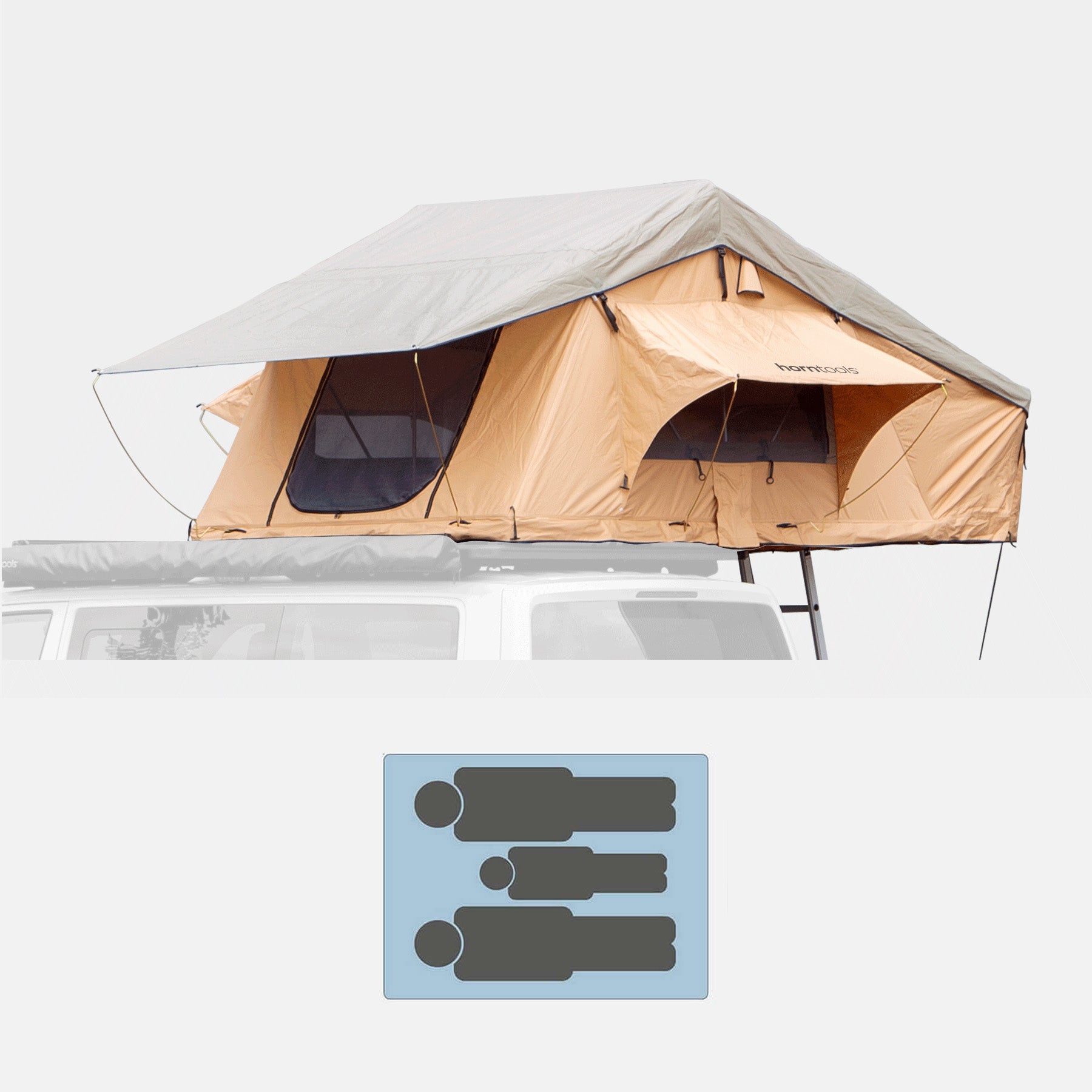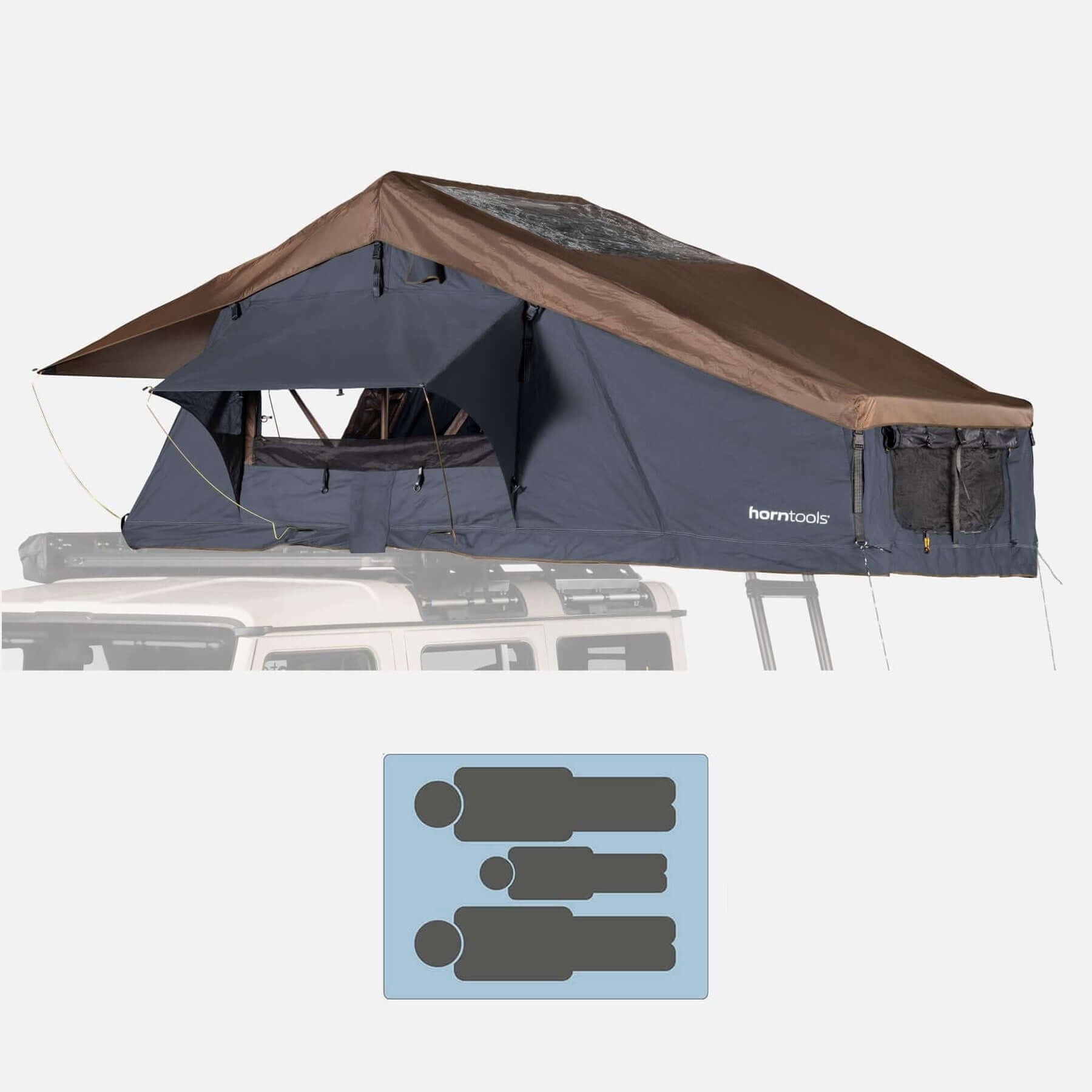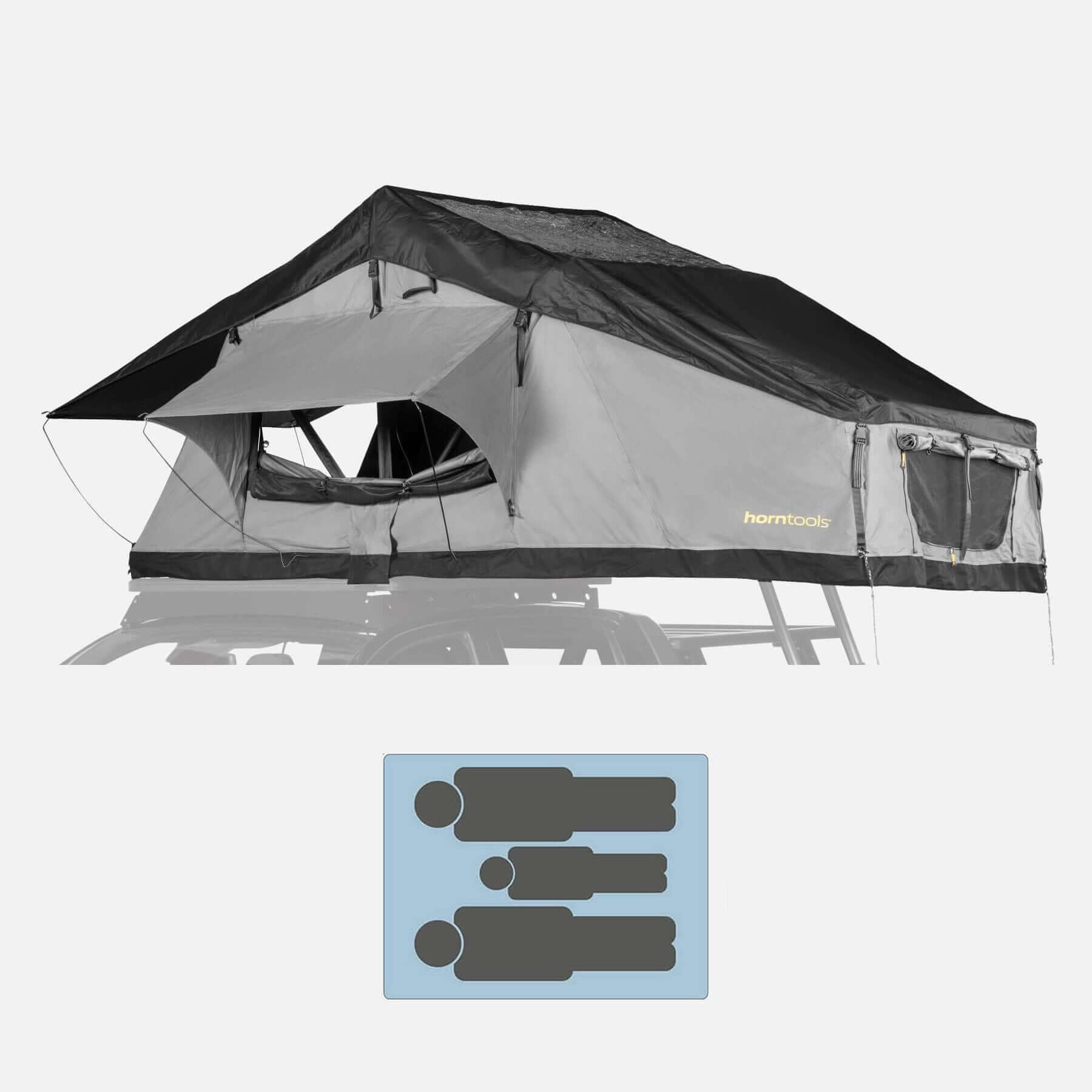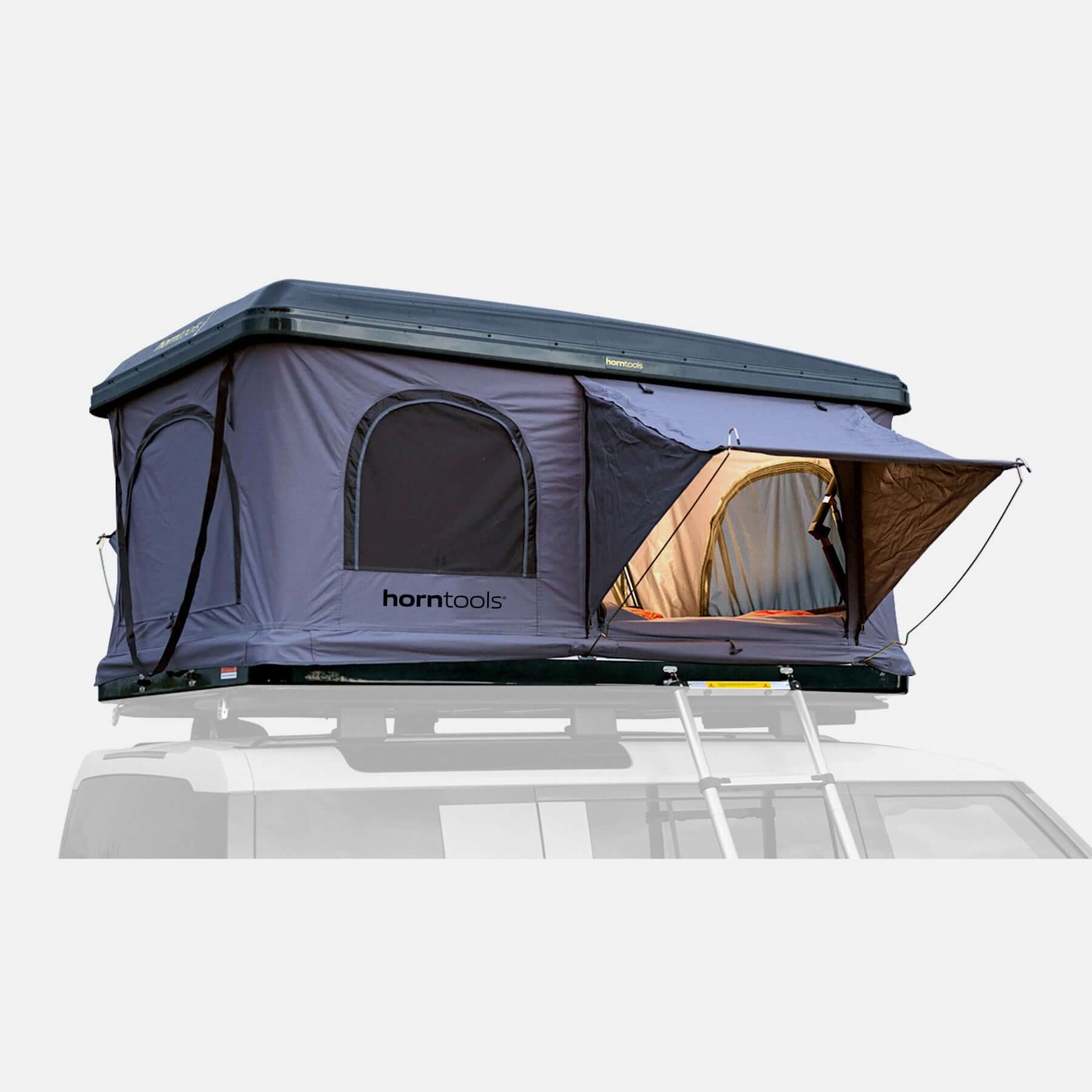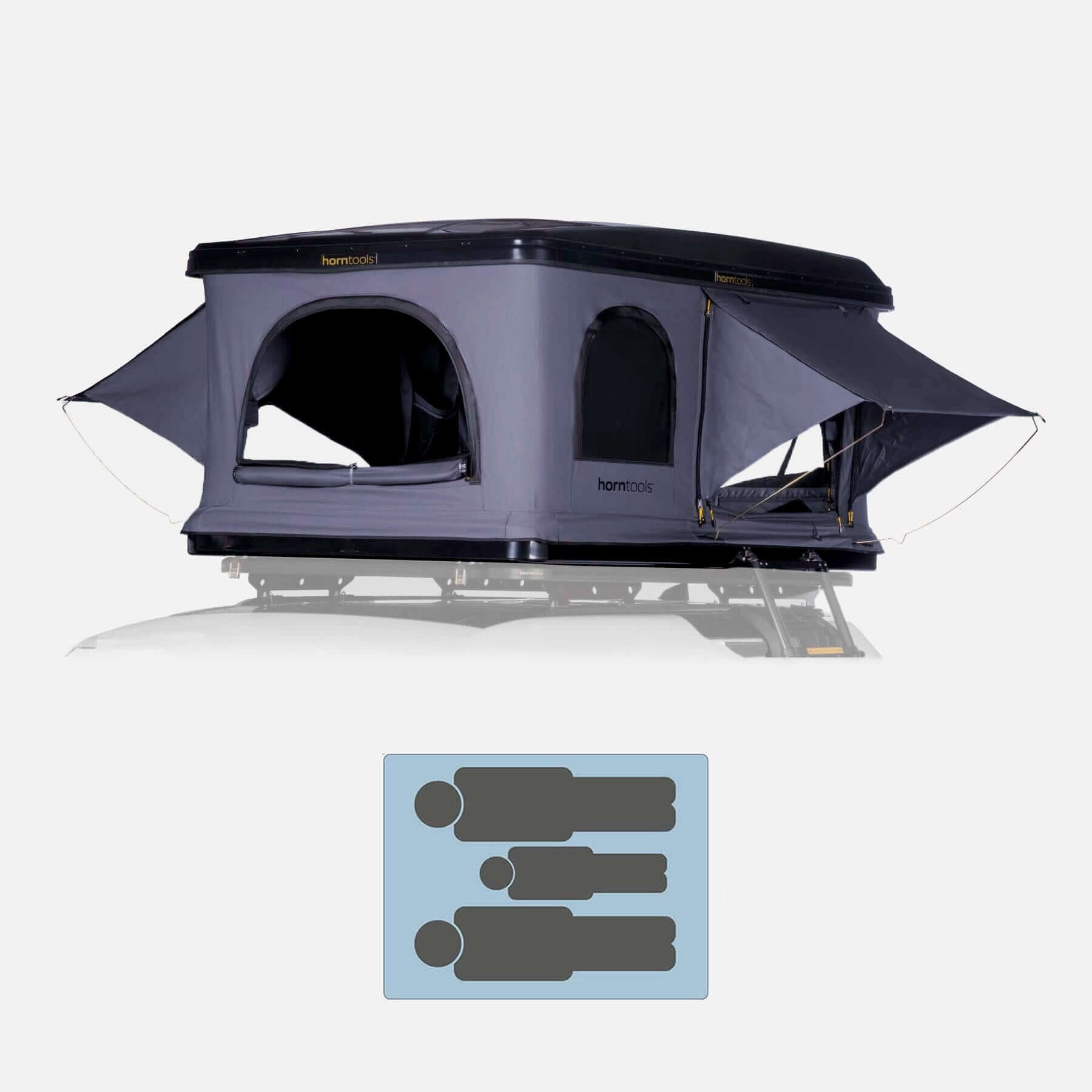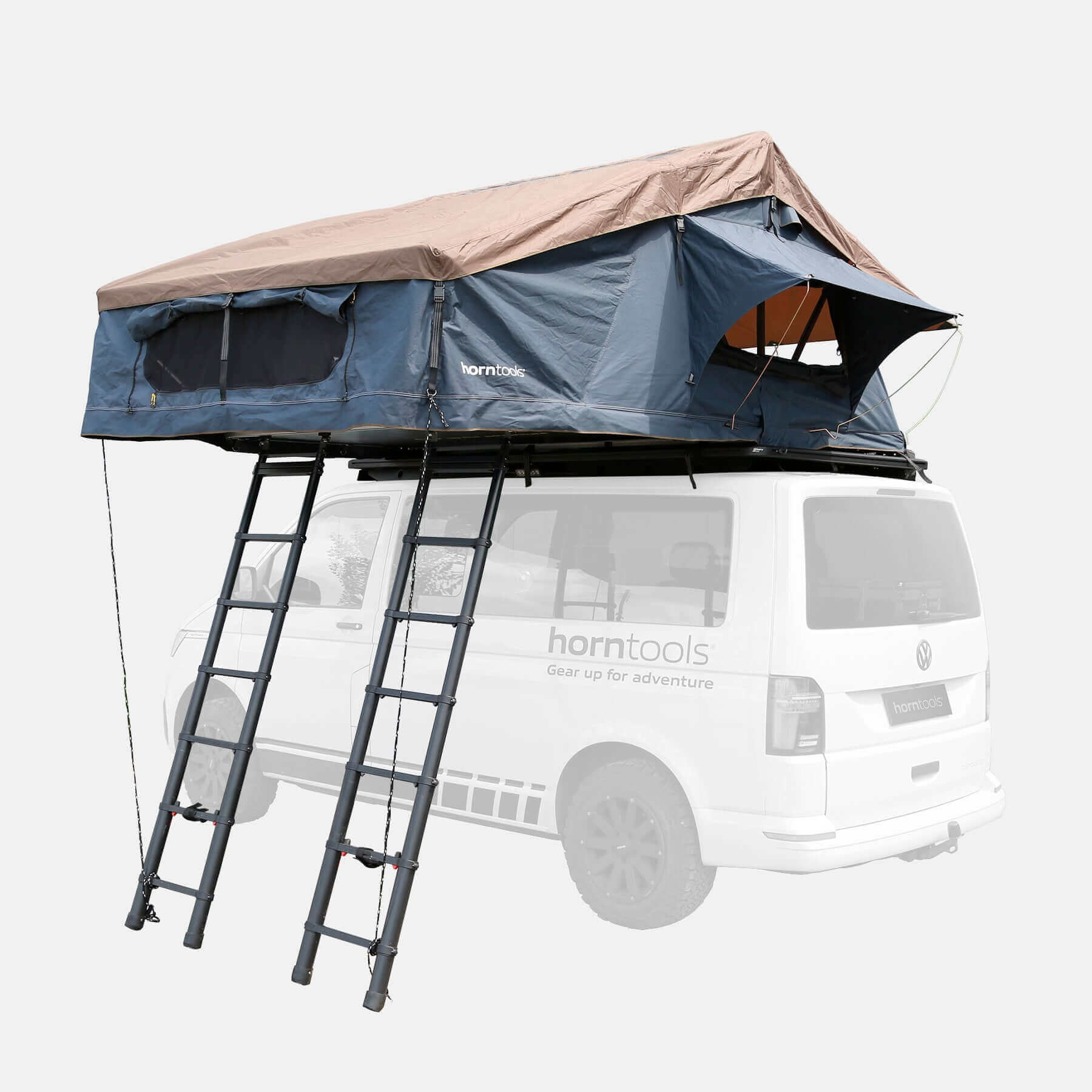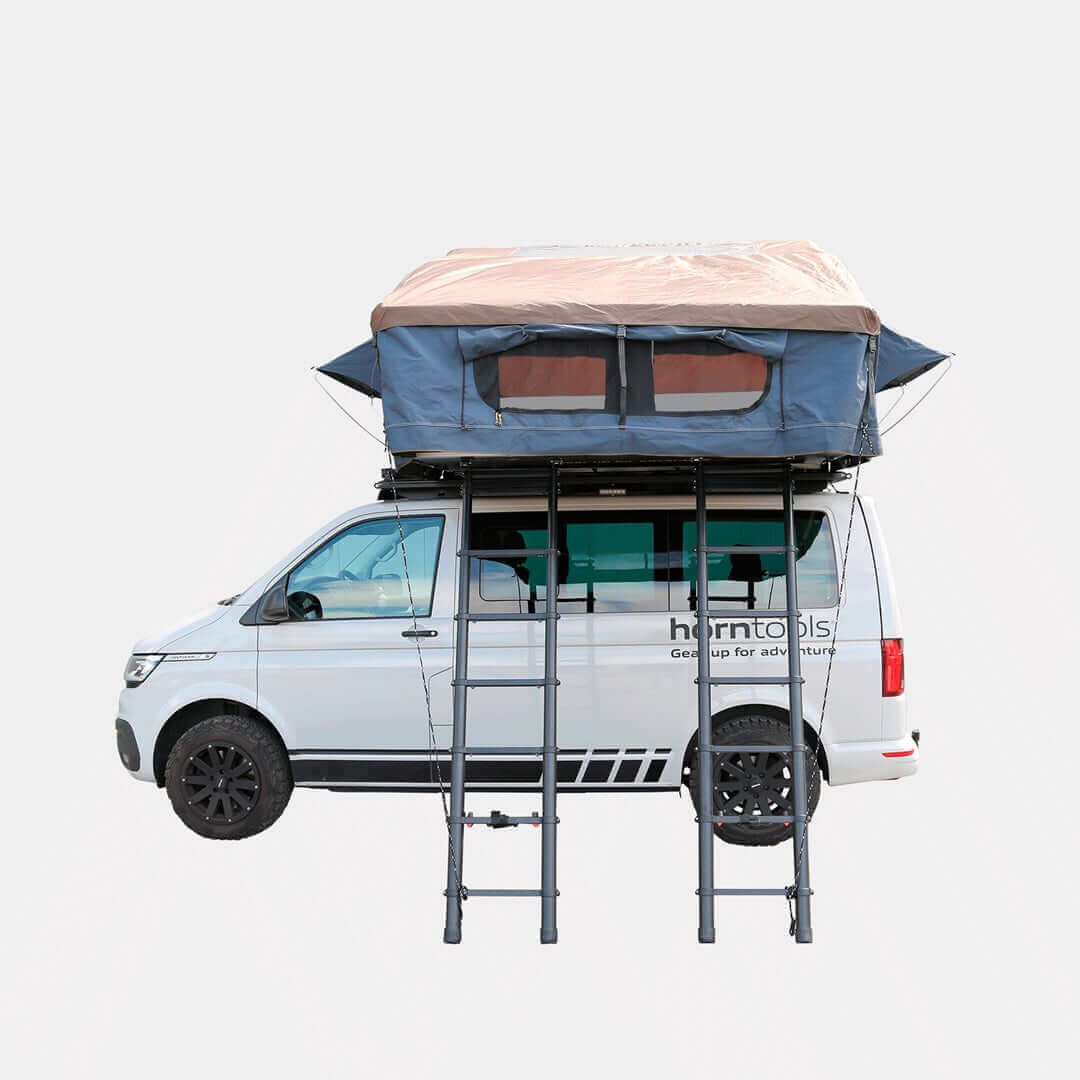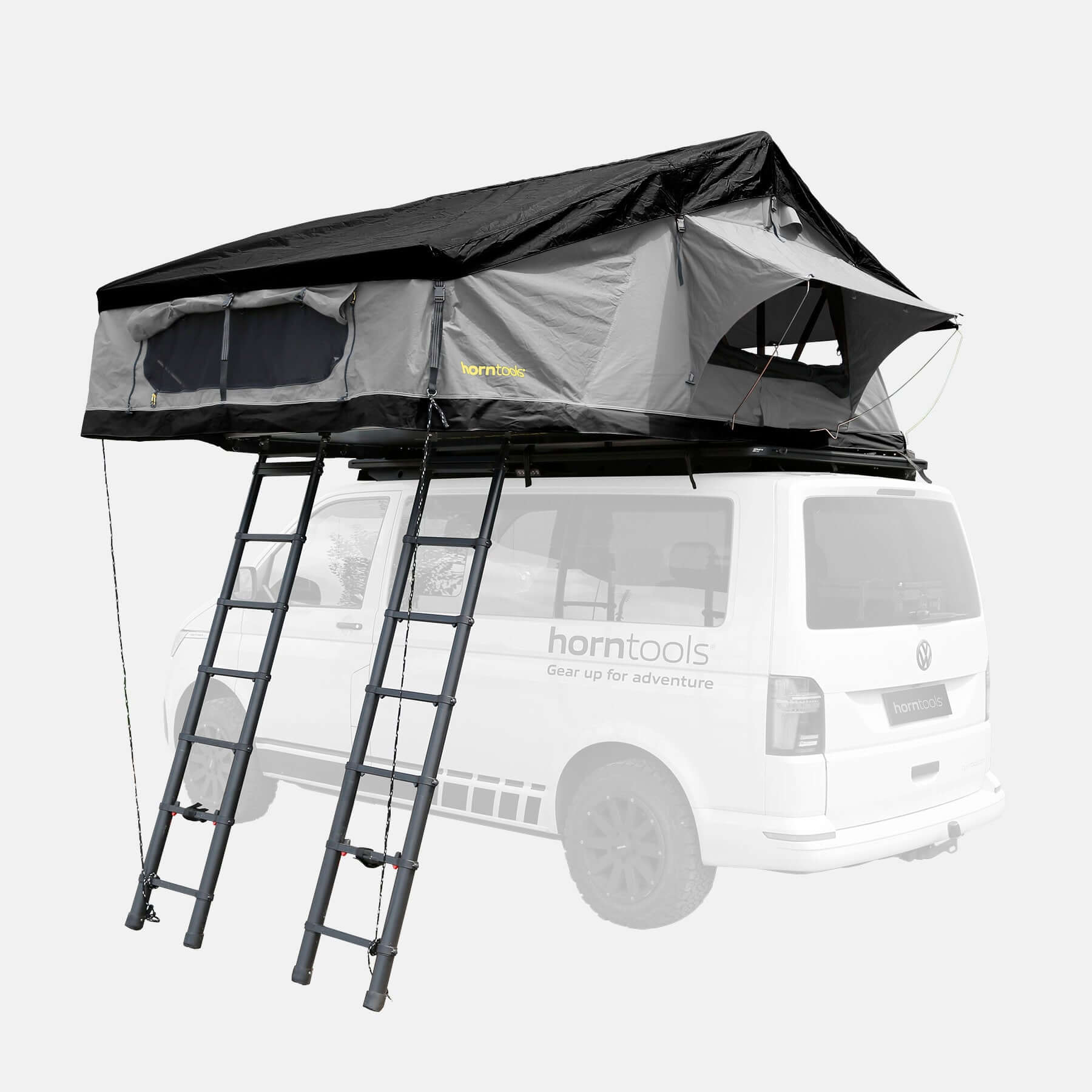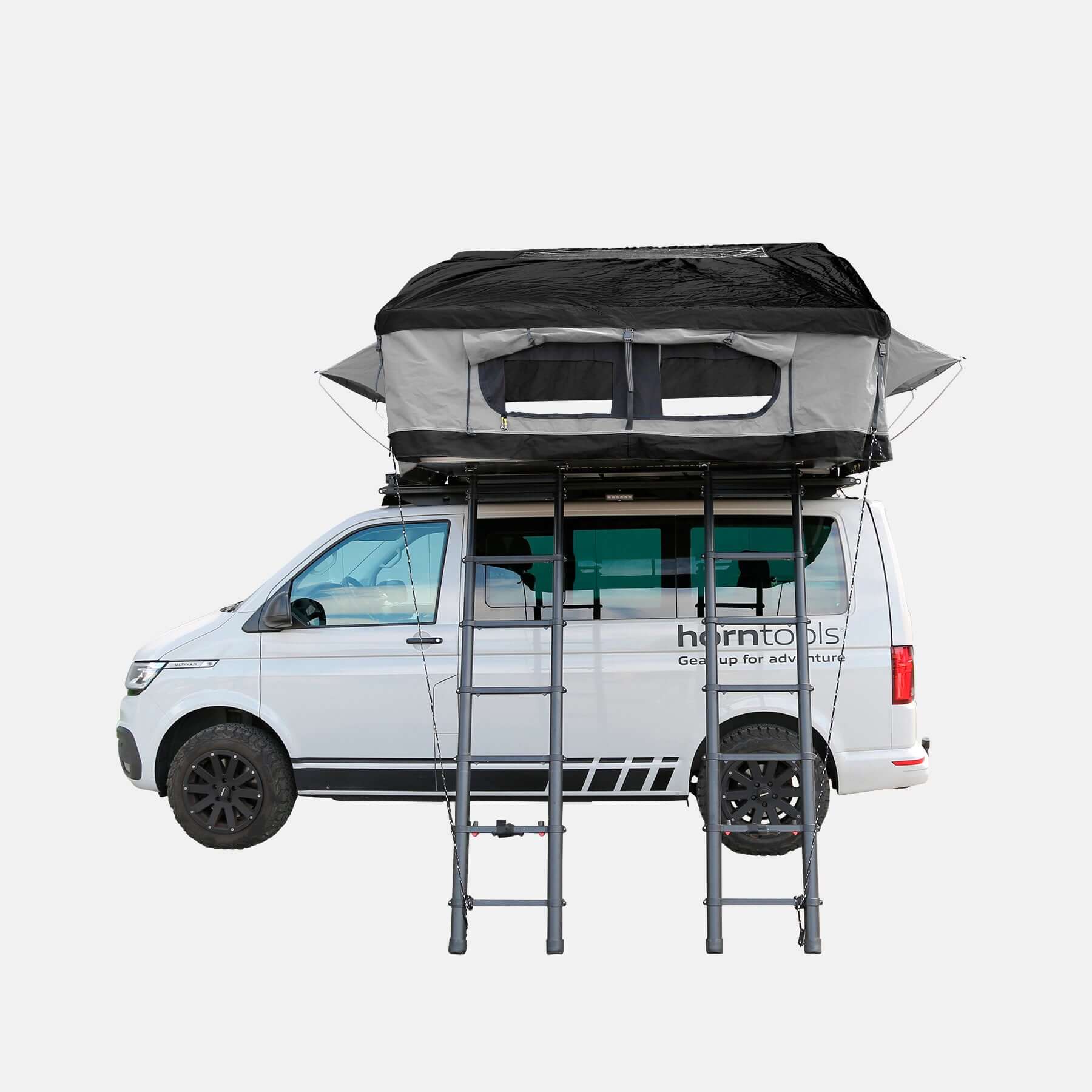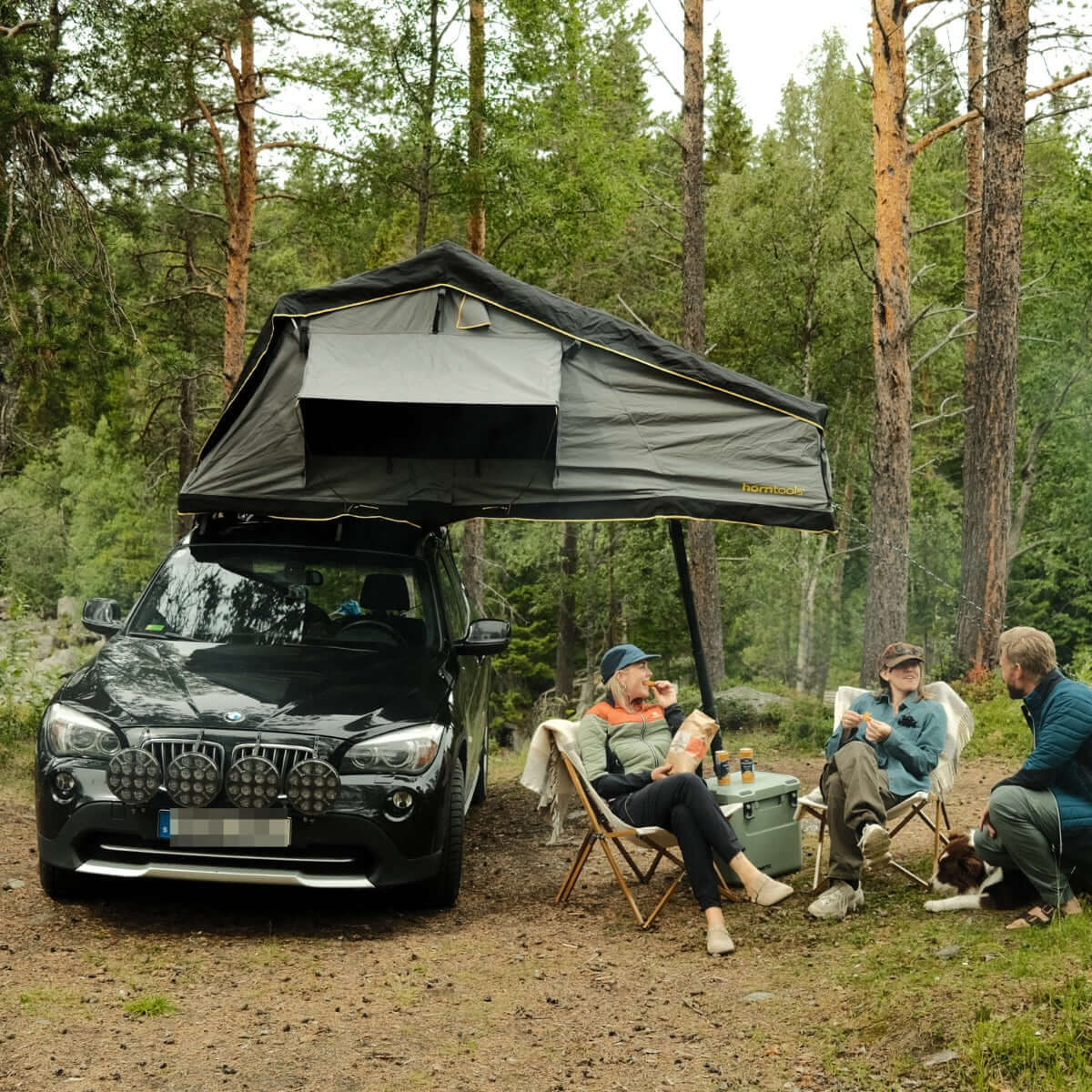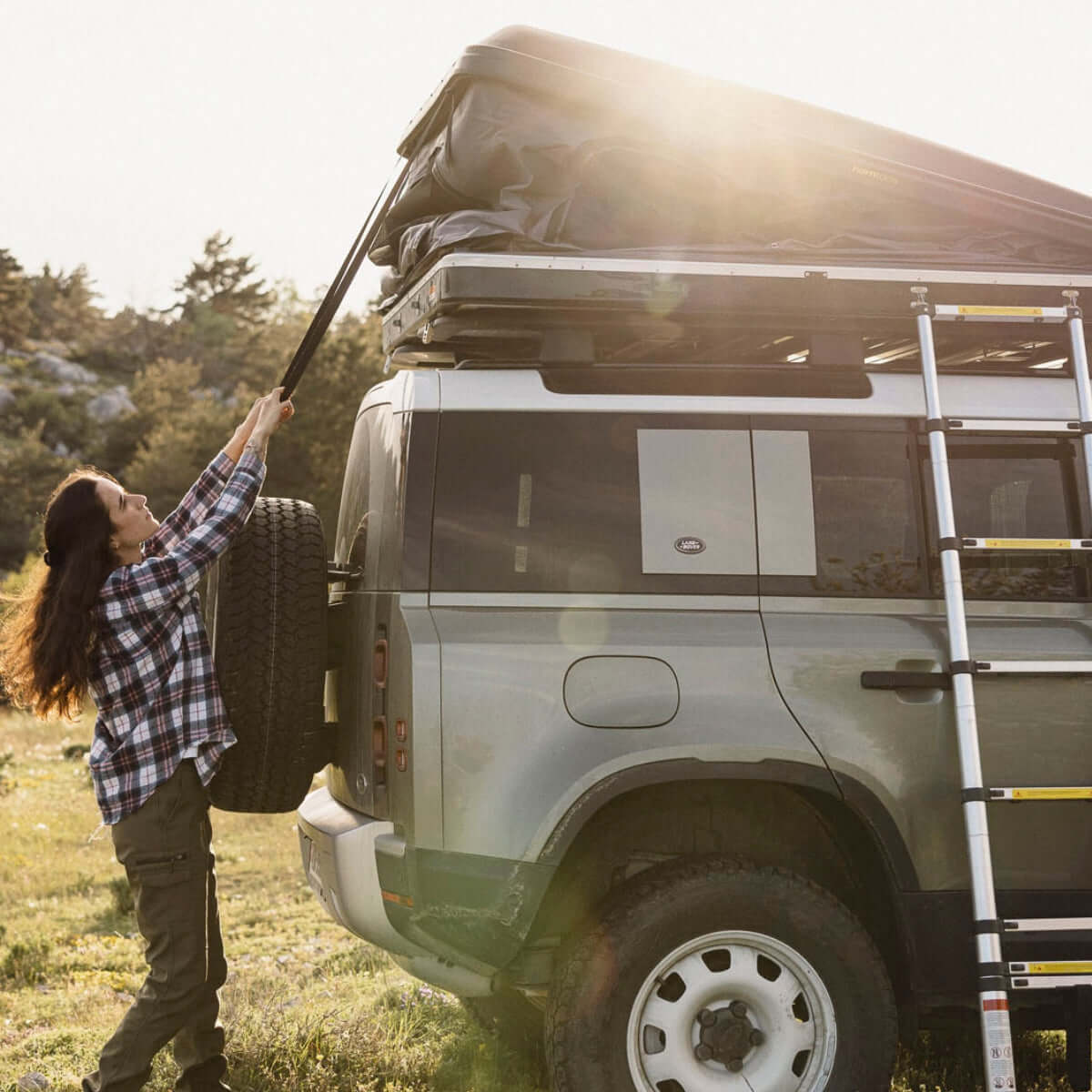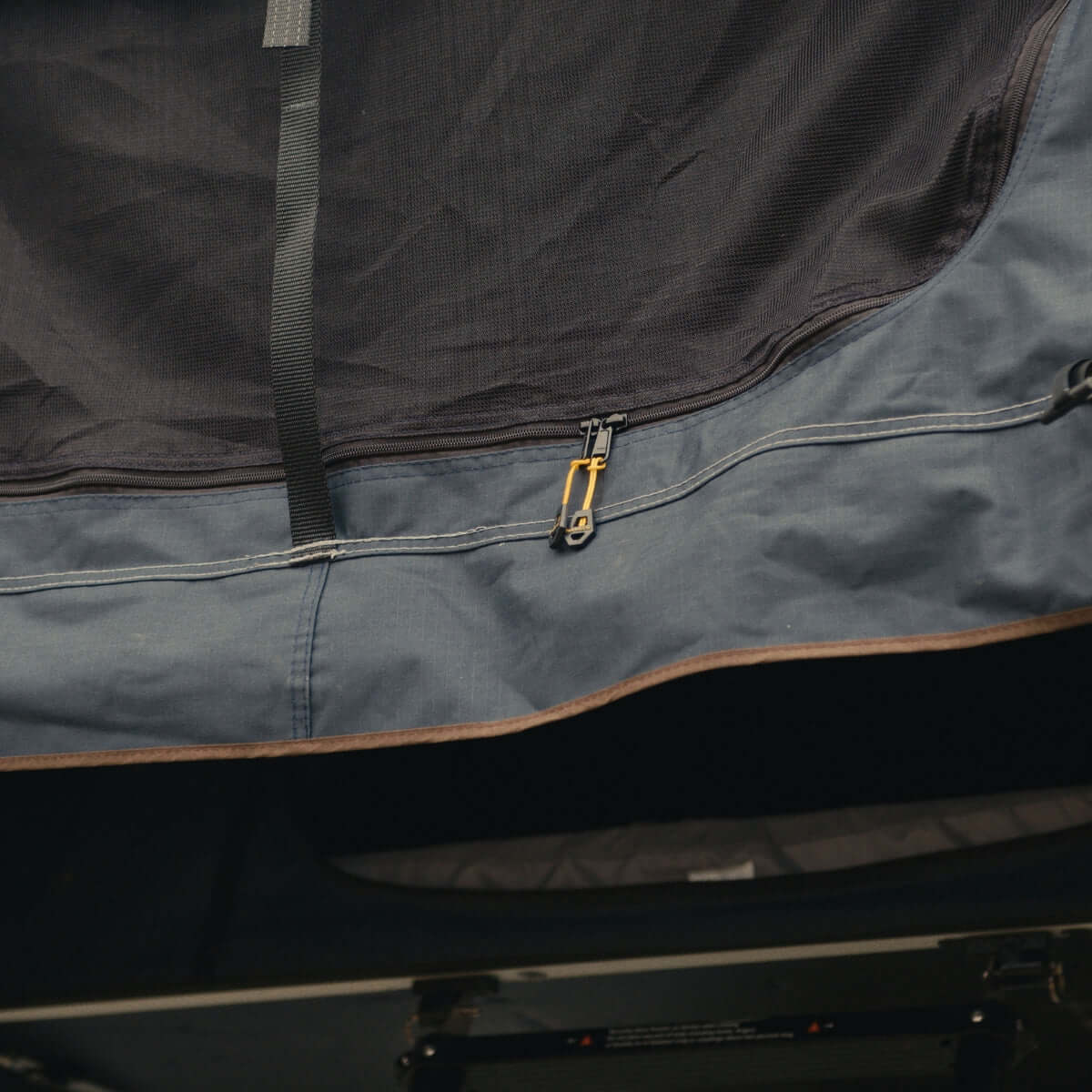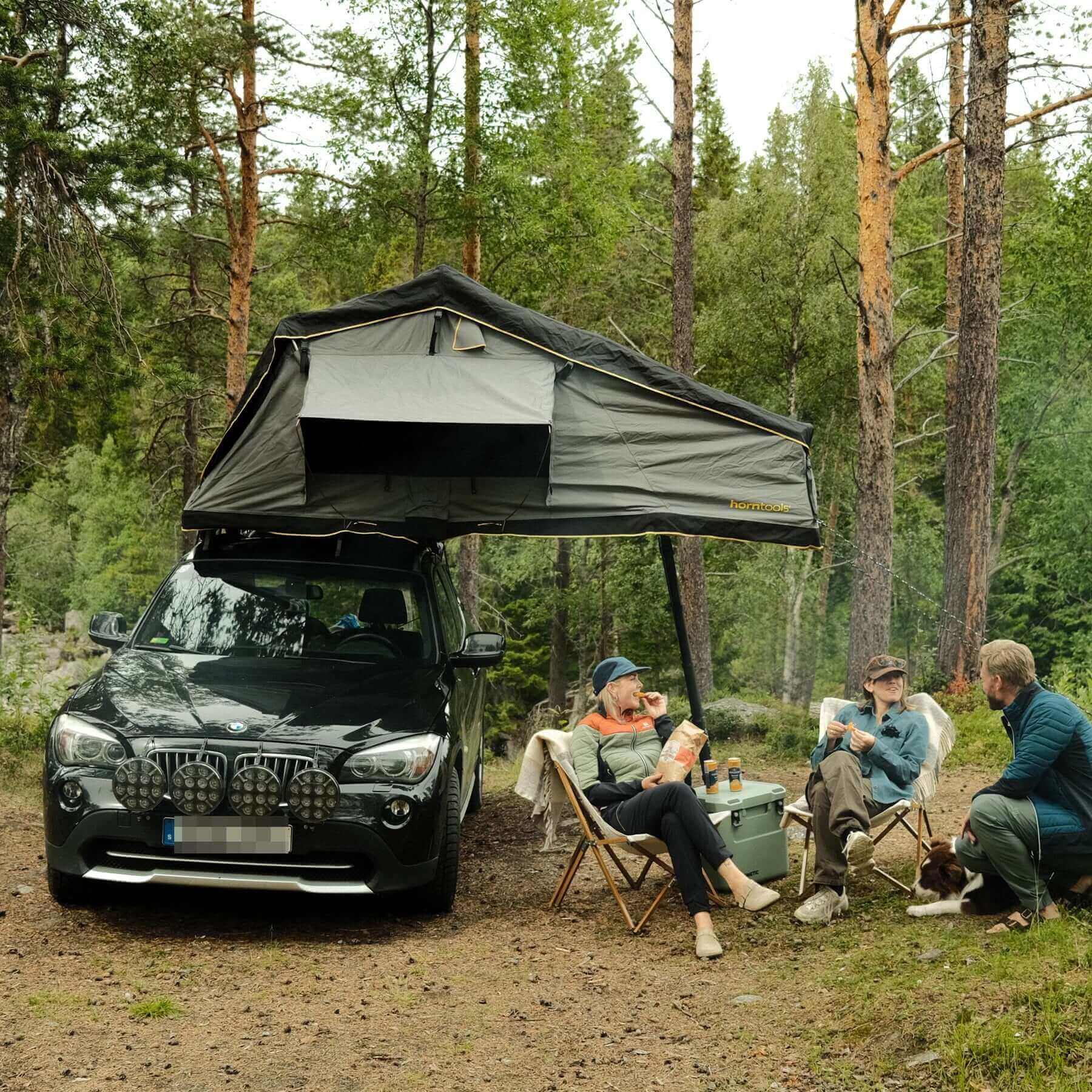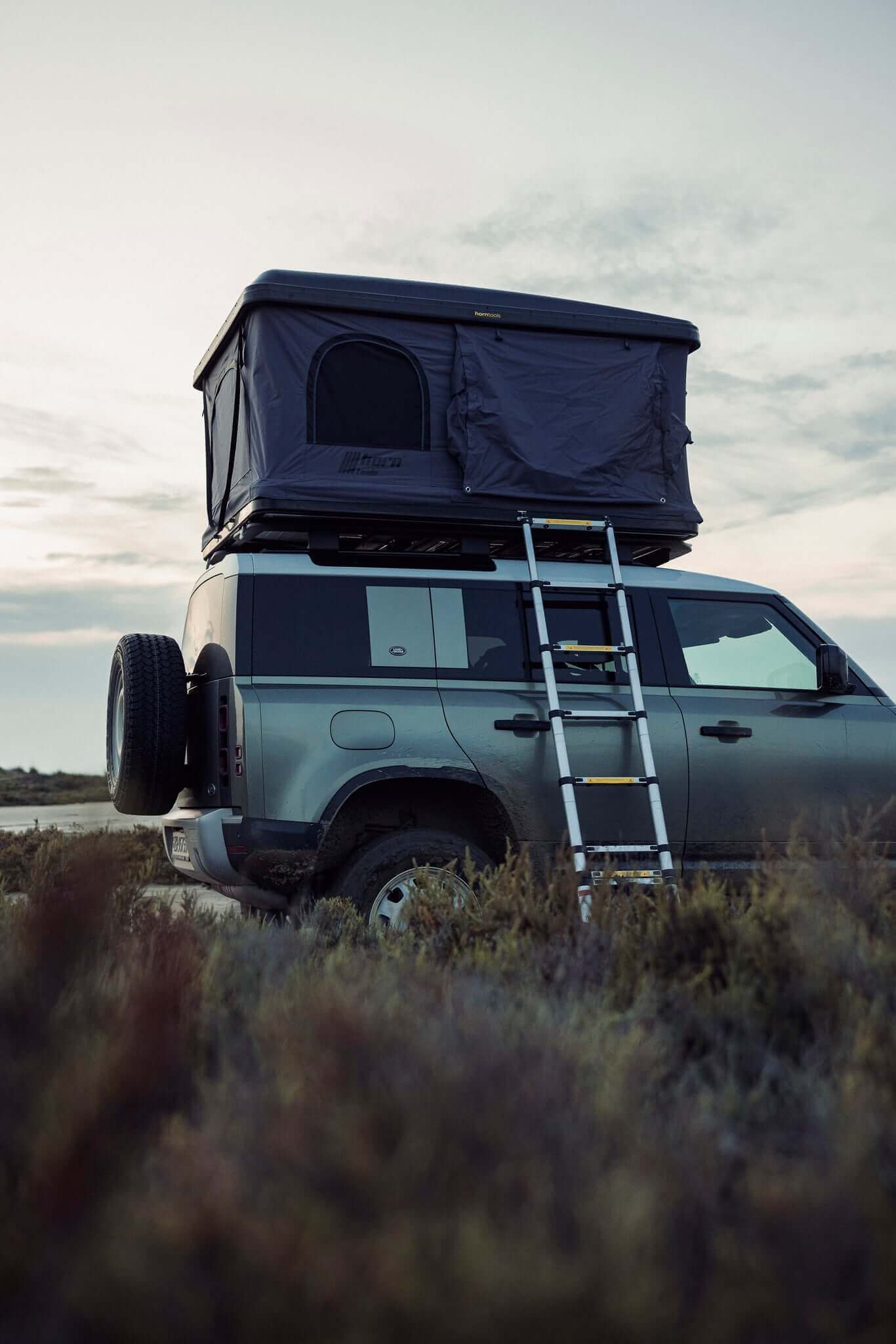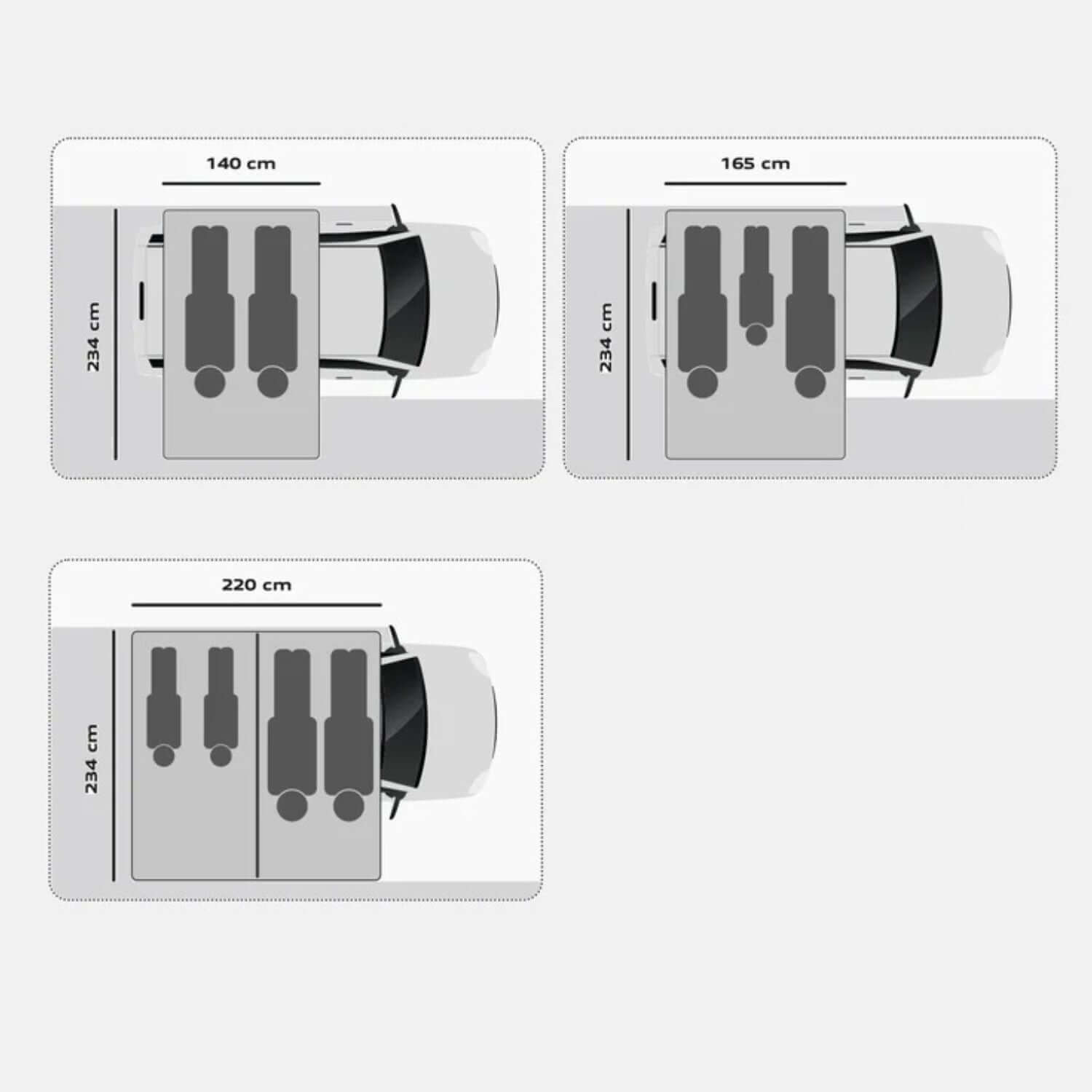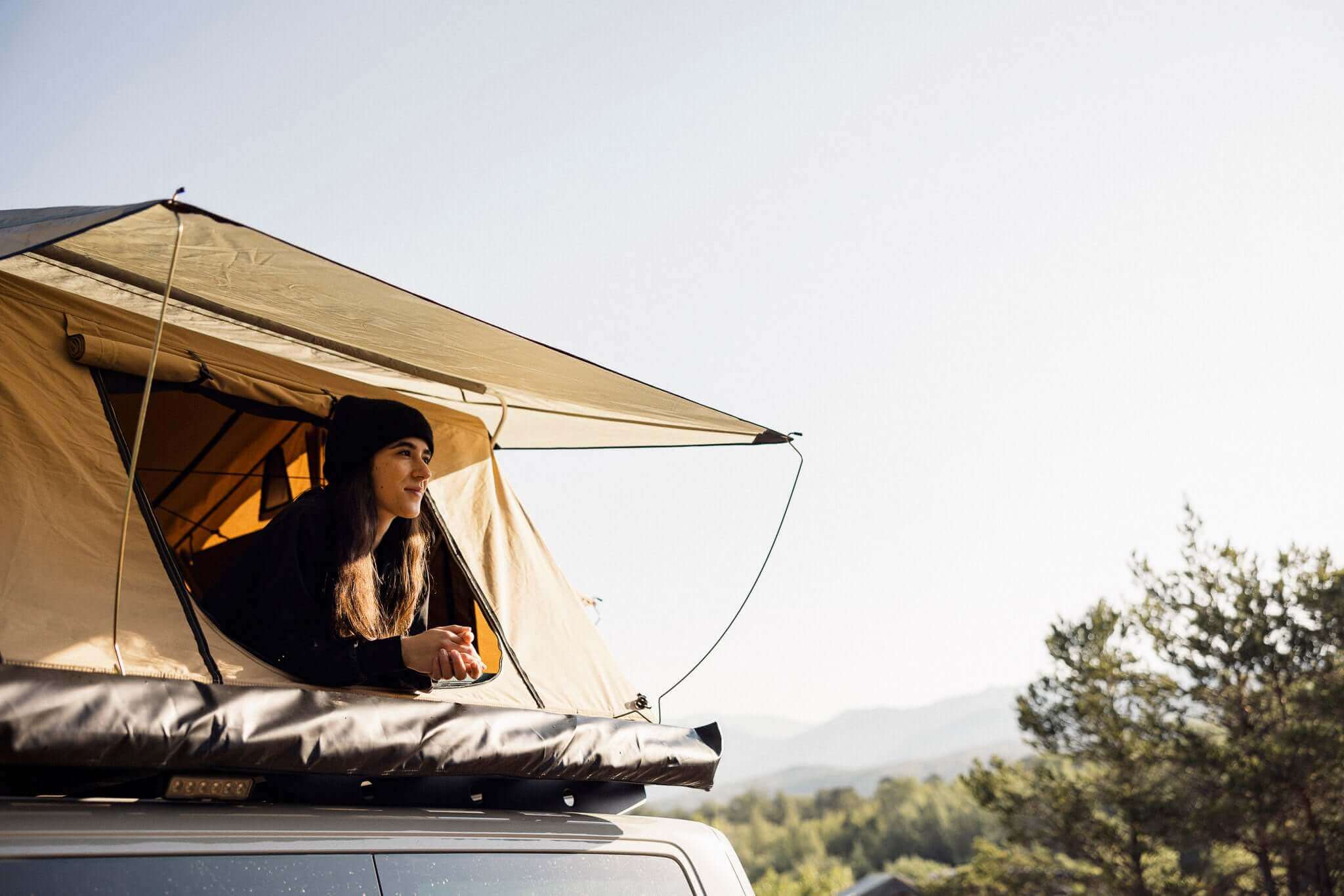Roof tents
Discover the ideal roof tent for your next road adventure. Choose from our various models to be perfectly equipped. Whether a compact car, SUV or a van with space for 4 people – we have the right roof tent for every need. horntools has been developing roof tents for over 10 years – robustness and durability define our products.
Roof tent for 1–2 people
Roof tent for 2 - 3 people
We are the test winner! ‘Convincing in terms of features, functionality, size, price and workmanship: With the best overall package, the GRP roof tent from Horntools deserves the test victory and a clear recommendation to buy.’

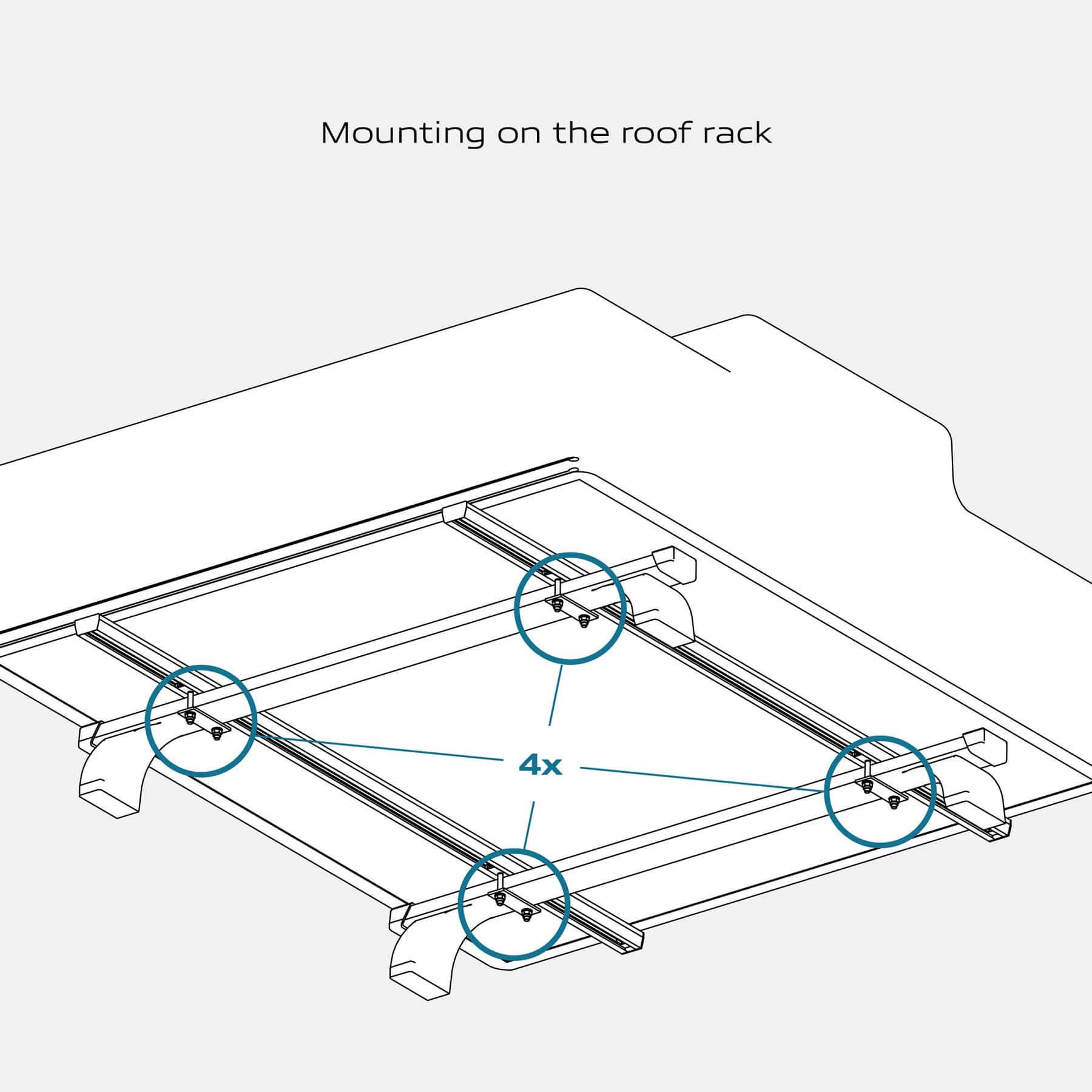
Roof tent installation
All our roof tents are easily mounted on the vehicle's roof rack. The roof tent is securely screwed to the racks using screws and counter plates. It doesn't matter whether you have two crossbars or a roof rack platform. All mounting materials are included with all our roof tents – so you don't have to worry about anything extra!
An overview of the horntools models
Are you still unsure which horntools model is right for you? Here you will find the most important information about our roof tents summarized in a clear comparison.
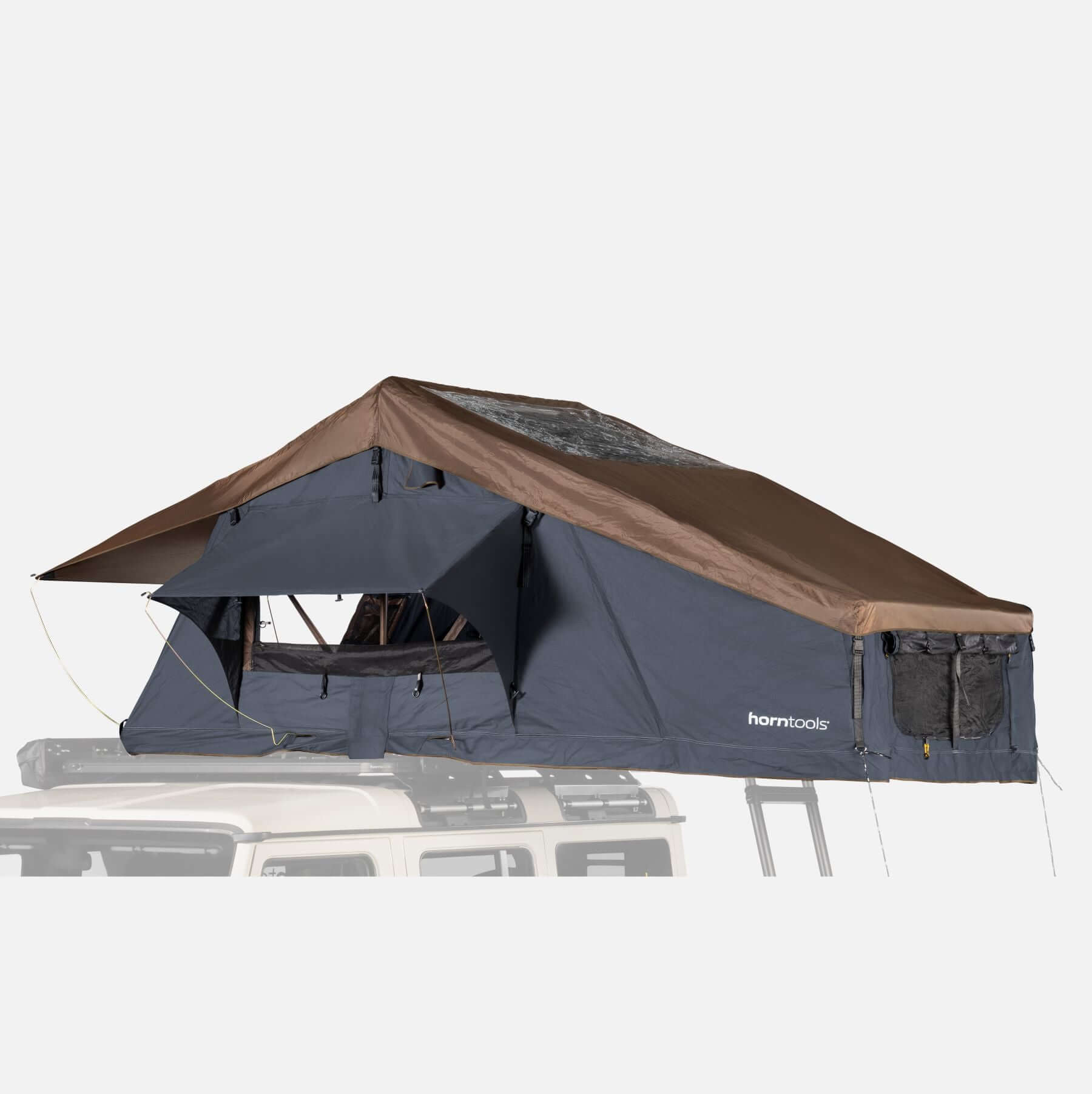
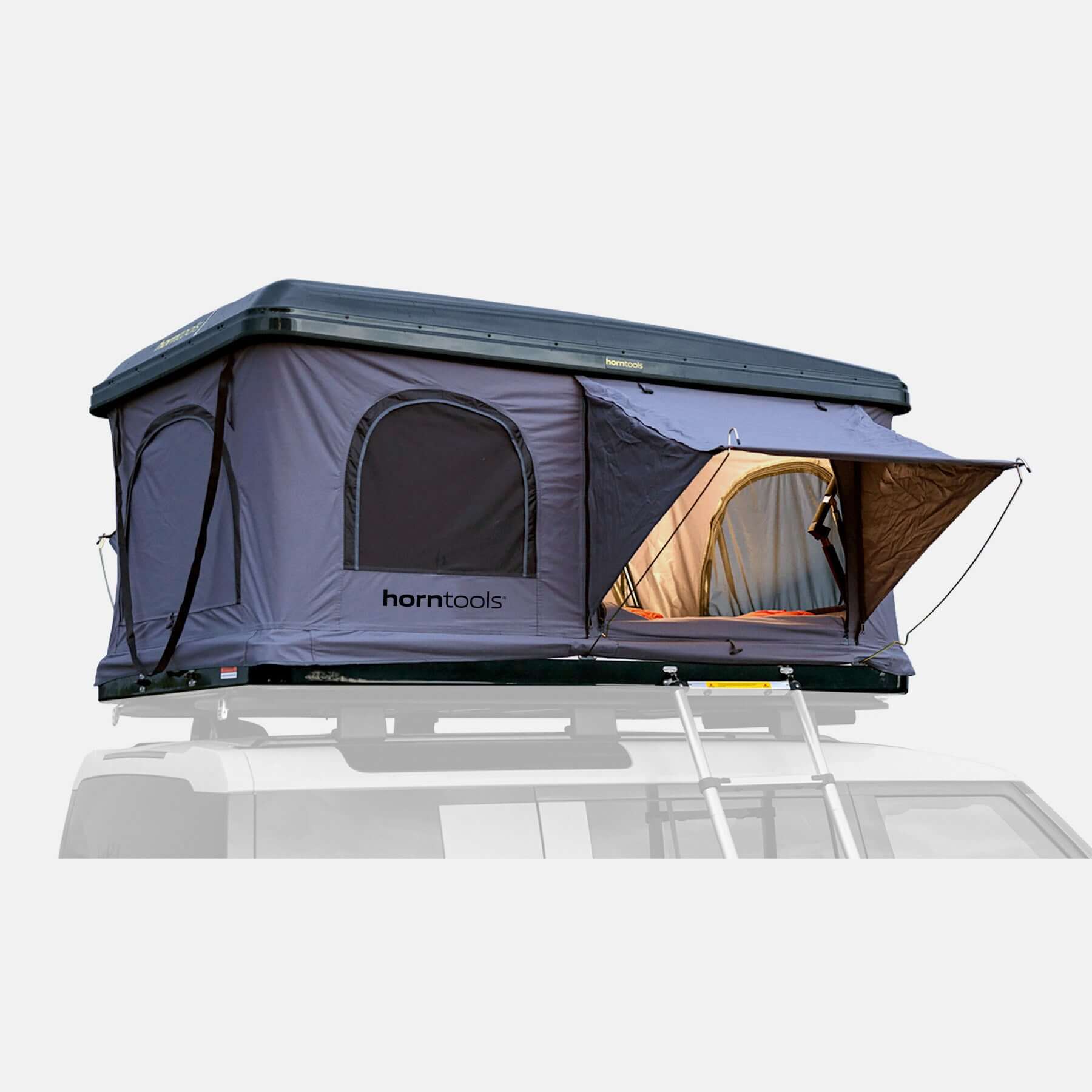
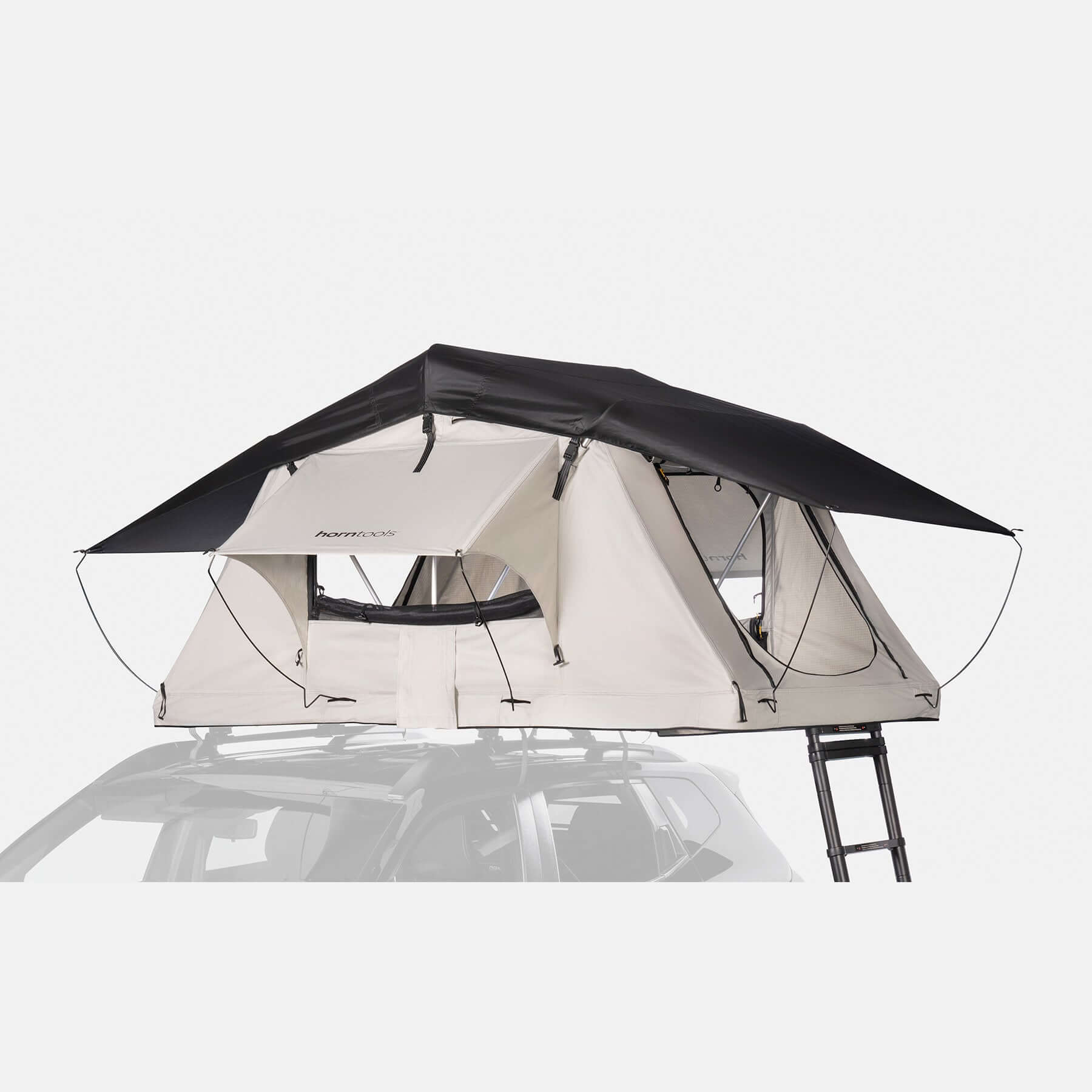



Folding roof tent
Hard shell roof tent
Folding roof tent
320 x 140 / 165 / 220 x 130 cm
220 x 150 / 165 x 100 cm
220 x 130 x 110 cm
2 to 4 persons
depending on model
2 to 3 persons
depending on model
2 persons
73,3 - 97,8 kg
depending on model (incl. ladder)
70 - 85 kg
depending on model (incl. ladder)
46 kg (including ladder)
2.190 - 2.990 €
2.990 - 3.290 €
1.199 €
Navy blue (Ocean) or gray (Midnight Stone)
Grey
Light grey
✓
✓
✓
✓
✓
✓
300g/m² Canvas with PU coating, 35% Cotton, 65% Polyester (Water column: 2000 mm + Fly Sheet 3000 mm)
Cotton, Canvas with PU coating (Water column: 2000 mm)
300g/m² canvas, breathable, made from 80% cotton and 20% polyester (Water column: 2000 mm)
5 min
3 min
5 min
✓
✖
✖
✓
✖
✓
✓
✓
✖
- Roof tent with cover
- Rain cover
- Guy poles
- Fastening material
- Black telescopic ladder
- LED lights incl. cable
- Mattress (8 cm cold foam)
- 3D mesh mattress base
- Shoe bag
- Operating & care instructions
- Roof tent with hard shell
- Fastening material
- Shoe bag
- Organiser bag
- Telescopic ladder with bag
- LED interior lighting
- Mattress (7 cm memory foam)
- 3D mesh mattress base
- Operation & care instructions
Roof tent with cover
Rain cover
Guy ropes
Fastening materials
Black telescopic ladder
Mattress (4 cm cold foam)
Operating and care instructions
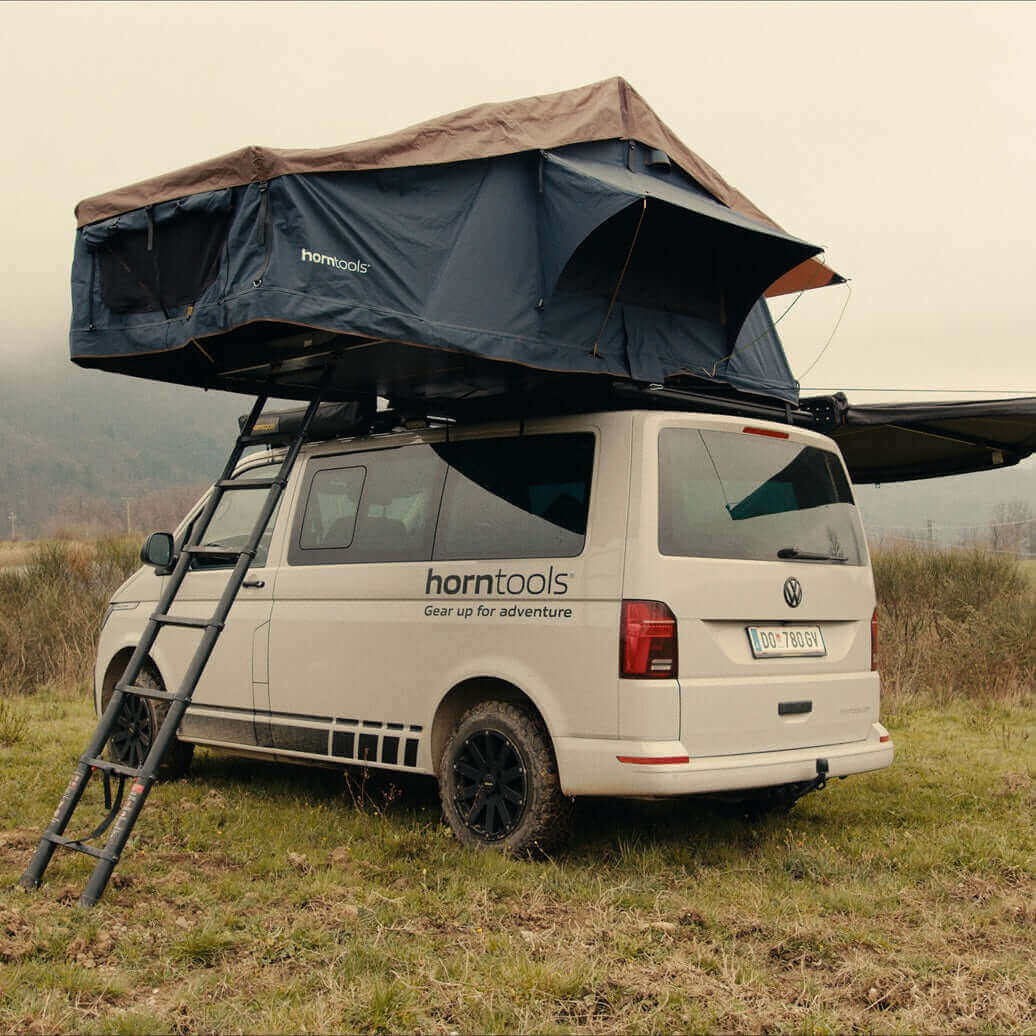
Ocean & Midnight Stone
Elements
The Elements roof tent perfectly reflects our many years of experience in the roof tent sector. It is available in Ocean (navy blue) and Midnight Stone (dark grey) versions and boasts many exciting features.
Discover now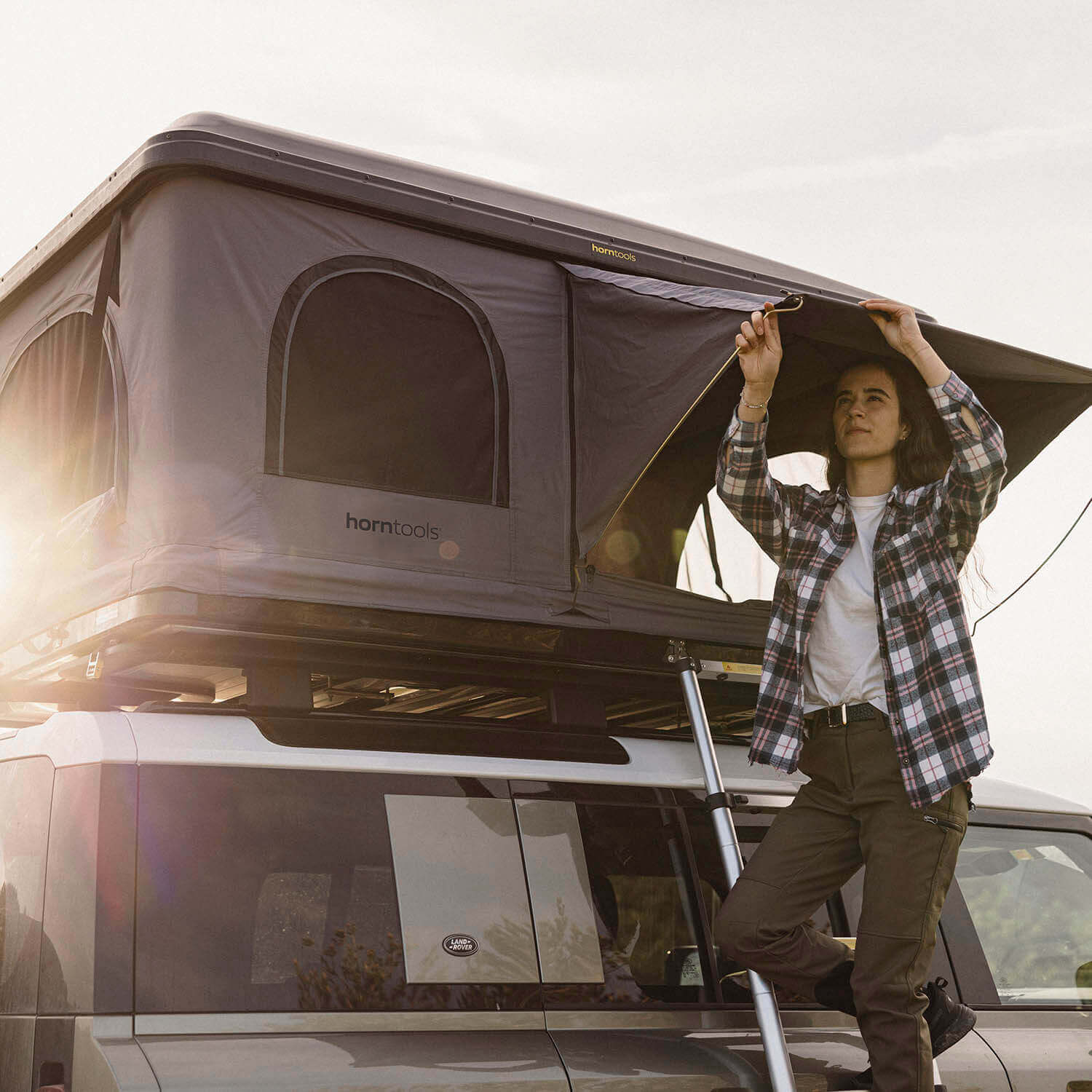
Themis Gen II
The new hard shell car tent from horntools. Set up in under three minutes, it offers plenty of space and comes with all the necessary accessories.
Discover now
Track
Our robust entry-level folding tent for all purists among campers. Compact in size, waterproof and offering unbeatable value for money.
Discover nowOur roof tents in use
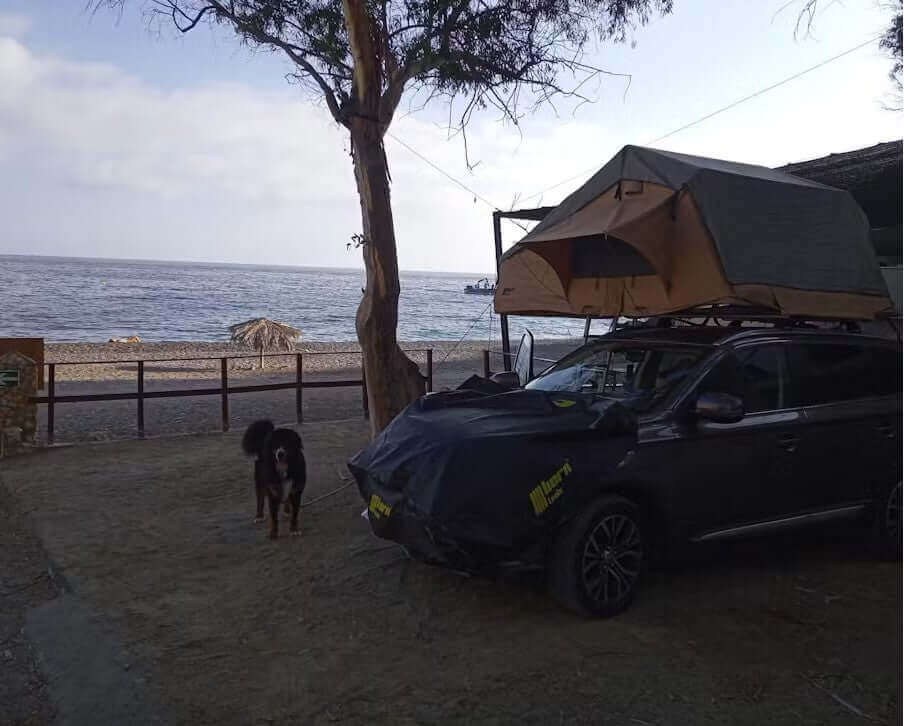
Johanna B.
Roof tent Desert
We used the roof tent on a Mitsubishi Outlander, 2 adults + dog. Setting up and taking down is simple and logical. The roof tent made us very flexible, everything was quickly packed up and ready for the onward journey. The annex room was easy to assemble and made it possible to sit together nicely, even in bad weather.
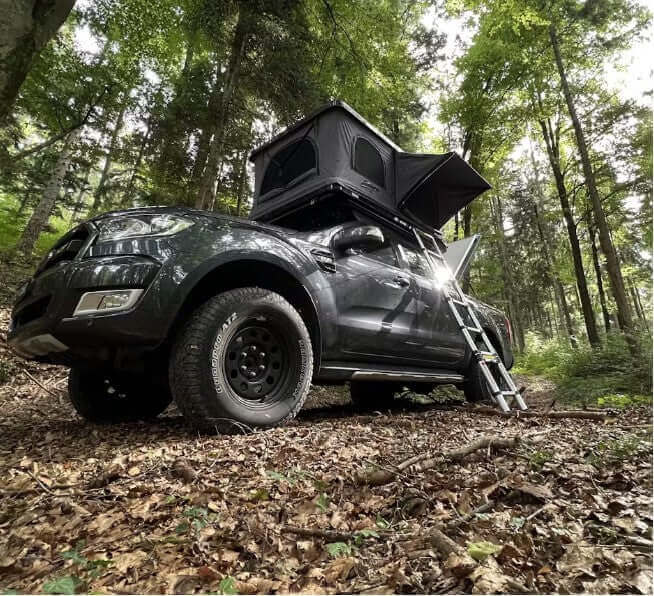
toit_aventure
Hard shell tent Themis
We decided on this roof tent a few months ago after very intensive testing, advice etc. from x different brands. We are completely satisfied and can recommend it to anyone who wants a hard shell roof tent. The on-site advice and installation was also highly professional.
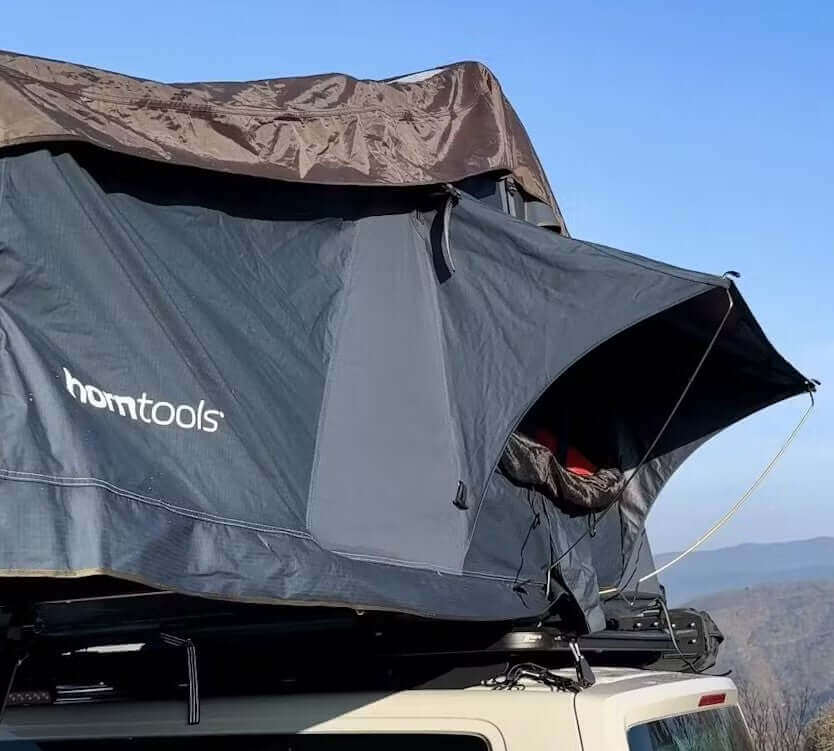
Stéfanie M.
Testimonials
After several days of research, we decided on the blue Elements in 140cm. Mainly because of the brand and the new features. We ordered it in March and have already spent five nights in it. I have to say... top-quality workmanship and super comfortable. The ladder is very practical, and the tent really sets up in just a few minutes. We're looking forward to spring; we can hardly wait to head to Spain soon!
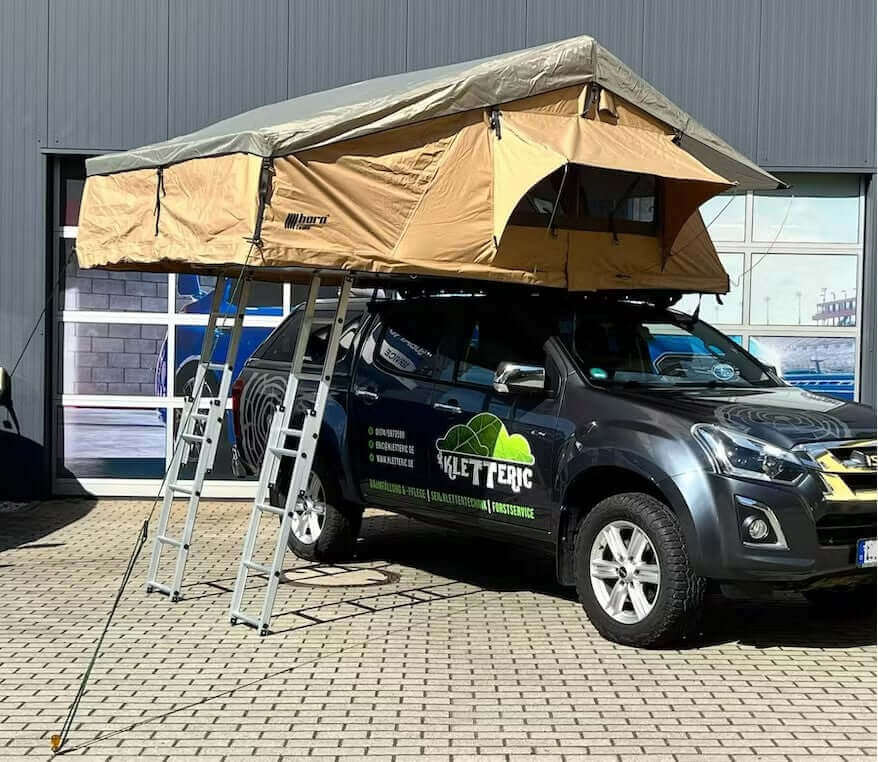
Éric P.
Roof tent Desert 220
We opted for the Desert 220. It offers more than enough space for 2 adults and two children aged 3 and 7. It was mounted on an Isuzu DMAX and a Horntools Navis was also installed as the base carrier. The first night even brought pouring rain, we all stayed dry and the accessories supplied are also great! We are looking forward to the coming adventures!
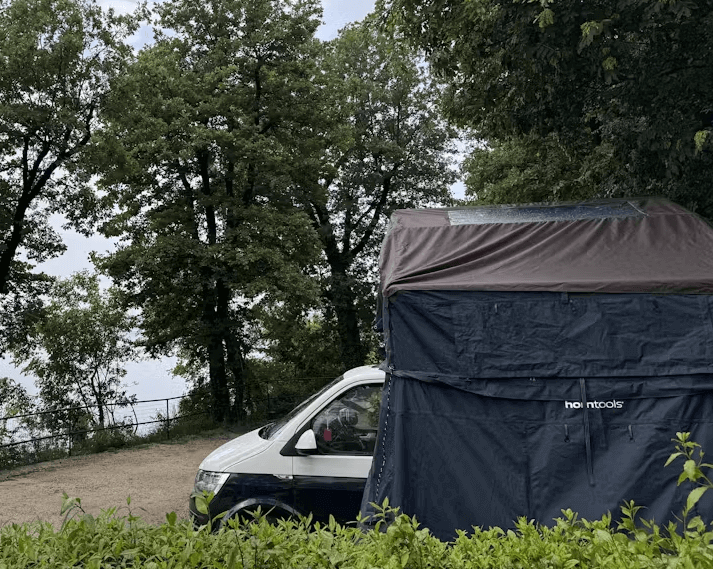
Christophe
Great tent
Great tent. We've used it for 10 days already. It stayed waterproof even in heavy rain. The telescopic ladders are also better because they don't squeak as much as the aluminum ones. Plus, you can use them for setting up and taking down things, making it easier to reach things.
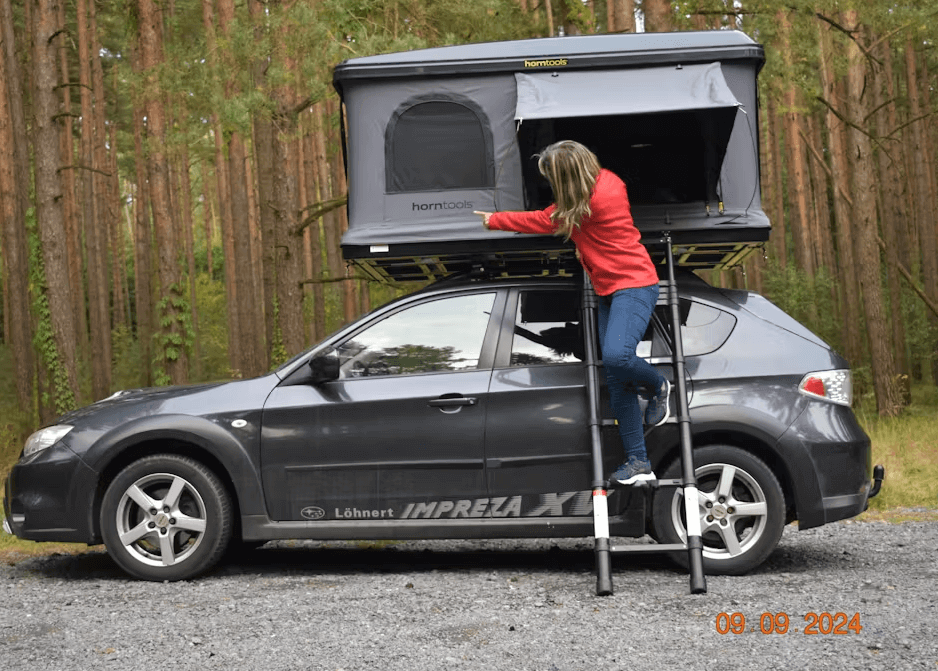
Gerhard & Anke
Love at first sight :)
It was love at first sight for us, the Themis hard shell roof tent leaves nothing to be desired.
Many thanks and best regards.
Gerhard and Anke
PS: Greetings to Belinda for her patient and excellent advice.
Type of roof tent
What are the advantages of a hardshell roof tent?
✅ Solid shell construction: This makes the roof tent flatter and more aerodynamic on the roof.
✅ Durable hard shell: This protects you from all weather conditions and makes you feel particularly safe.
✅ Time-saving: The horntools hard-shell roof tent sets up in under three minutes. You save even more time by stowing your bedding in the roof tent while it's still folded up.
✅ Contemplative size: The roof tent usually does not exceed the side mirrors of your vehicle, so you can easily spend the night almost anywhere in permitted locations.
What are the advantages of a folding tent?
✅ Cheaper price: But you need a little more time to set it up.
✅ Low weight: Ideal for vehicles with lower roof loads.
✅ Very spacious: If you are traveling with child(ren), a folding tent offers you enough space.
✅ Overlapping area provides a shady spot: So you usually don't need an additional awning.
Folding tent or hard shell roof tent – which is better?
The choice between a folding and a hard-shell roof tent depends on your personal usage requirements, preferences and budget.
The folding tent is mounted on an aluminum plate, is set up by unfolding the plate, and is protected by a rubber cover when closed. When closed, it is approximately 10 cm higher than the hard-shell roof tent.
There's no single roof tent option that offers more advantages than another. It's important to consider your own needs and compare them with the pros and cons of each roof tent option. Here's another comparison between a folding tent and a hard-shell tent that can help you make your decision:
In our ADVENTURER magazine, you'll also find an article with a detailed comparison between folding tents and hard-shell tents . If you're unsure, feel free to stop by one of our numerous horntools showrooms . There, you can test out our roof tents, discover their features, purchase them on-site, and even have them installed.
How much does a roof tent cost?
Pop-up tents are generally cheaper than hard-shell roof tents. The folding tent Track is our most affordable model. Priced at just €1,199, it is one of the most attractive options for anyone looking for a high-quality rooftop tent at a competitive price. In contrast, the Elements series – available in Ocean and Midnight Stone – ranges from €2,190 to €2,990, and comes with many refined details, such as a thicker mattress for extra
comfort. The proven and award-winning Themis hard shell tent in the 140 cm version is priced at €2,990. The larger 165 cm model is available for €3,290.
How much space does a roof tent offer?
Depending on the model, roof tents can accommodate up to four people (two adults and two children). Generally speaking, the 140 cm mattress is designed for two adults, the 165 cm mattress for two adults + one child, and the 220 cm mattress for two adults + two children.
Which roof tent is suitable for 4 people?
The Elements roof tents in Ocean and Midnight Stone, especially the 220 cm version, are particularly suitable for four people or families. These models are equipped with two separate ladders and a partition. The car roof tent is divided into two separate rooms/chambers and therefore offers ideal space for four people. The partition is attached using Velcro and can be removed if necessary. The length of the sleeping area is always around 230 cm. In our magazine article "Roof tent for four people" you will find some important tips and tricks for roof tent travel with the family. In our range, you will also find practical accessories such as the roof tent anti-theft device LockMagnet.
Roof tent assembly and storage
Which car does a roof tent fit on?
In principle, you can mount a roof tent on any car, but it requires a roof rack attached to the car roof.
It doesn't matter whether you use two crossbars as supports or a roof rack platform. What matters is that the car roof offers sufficient space in both width and length for the roof tent, and that the width of the roof rack is compatible with the roof tent mount.
Additionally, the permissible roof load specified by the vehicle manufacturer for the installation of roof racks and roof tents must be observed. This can usually be found in the vehicle manual or can be requested directly from the respective manufacturer. For smaller vehicles with lower permissible roof loads, folding tents with a lower weight are recommended.
What does roof load mean?
The roof load referred to by the vehicle manufacturer in the manual is the dynamic roof load. This is the permissible load on the roof of your vehicle while driving. For example, if your vehicle has a specified roof load of 80 kg, your roof tent + roof rack may weigh a maximum of 80 kg. However, when stationary, you can sleep in the roof tent without any concerns.
What roof load do I need for a roof tent?
There is no standard roof load limit for a roof tent. This always depends on the individual weight of the roof tent. For example, if a roof tent weighs 50 kg, a maximum permissible roof load of 70 kg, including roof racks, may be sufficient according to the vehicle manufacturer. However, if the roof tent weighs 70 kg, a correspondingly higher roof load limit is required.
Do I need a special roof rack for a roof tent?
A roof rack attached to your car is a prerequisite for installing a roof tent. As long as the width of the rack is compatible with the roof tent mount, you can mount a roof tent on any roof rack.
💡Tip: If you don't have a suitable roof rack yet, feel free to check out our mounting brackets . Alternatively, you can also use a roof rack platform or crossbar support from another supplier.
How do I assemble my roof tent?
To install the roof tent, you need to lift it onto your roof rack. This is best done with the help of two to four people. Then, the roof tent is mounted to the roof rack at four points using screws and counter plates.
Attention: The fastening screws of the sliders are made of stainless steel and should only be tightened by hand and preferably oiled after each assembly.
All mounting hardware and tools are included with our roof tents. Detailed instructions can be found in our assembly videos on the respective product pages.
How long does it take to set up the roof tent?
How long it takes to set up a roof tent naturally depends on the roof tent model. Generally speaking, setting up a hard-shell tent takes about 3 to 5 minutes, while setting up a pop-up tent takes between 7 and 20 minutes. After setting it up 2-3 times and with a little practice, setting up a roof tent is generally very easy.
How do I store my roof tent?
If you're not using your roof tent or awning for an extended period, such as during the winter months, it's a good idea to take them down. This not only protects and preserves the product, but also makes your vehicle more economical and safer (without additional attachments). The roof tent should only be assembled and closed when it's completely dry. Moisture could lead to mold growth over time.
Can you leave a roof tent on your car all year round?
Theoretically, you can leave a roof tent—whether it's a folding tent or a hard-shell roof tent—on your car year-round. The rubber cover or hard shell protects it from all weather conditions. However, to reduce the overall weight of the vehicle and thus fuel consumption, it's worth removing the roof tent if it won't be in use for an extended period.
Caring for a roof tent
Do I have to ventilate the roof tent?
The secret to a long lifespan for your roof tent is: ventilate, ventilate, ventilate – even while in use. Ventilate your roof tent regularly, even when traveling, ideally in sunny weather. It's best to open all the windows to ensure maximum air circulation. We also recommend using a mattress pad to prevent moisture buildup.
How do I clean a roof tent?
The roof tent should only be cleaned with cold or lukewarm water and a soft brush. Do not use chemicals, soaps, or detergents. The zippers will last longer if you spray them with silicone spray. If mold should form, remove it with a sponge and then let the tent dry completely. It's best to re-waterproof it afterward.
How do I care for a roof tent?
To ensure the longevity of your roof tent even after purchase, there are some recommended care instructions:
The seams of your roof tent are the heart of the tent, so they require special care. To ensure their longevity, they must not dry out completely, as this can lead to the seams breaking. We therefore recommend checking them regularly and treating them with a block of beeswax. This adds elasticity to the seams and promotes watertightness. Should the seams nevertheless leak, you can remedy this with seam sealer. The zippers also require a treatment with silicone spray to ensure reliable operation.
Here you can learn more about the proper care and cleaning of your roof tent.
Do I have to waterproof a roof tent?
All roof tents are delivered freshly waterproofed. You can repeat this process every one to two years, depending on use. It's best to use a high-quality waterproofing product or spray from a tent or outdoor retailer—this provides waterproofness and UV protection.
On the road with the roof tent
Where can I stay overnight with the roof tent?
Wild camping in nature, i.e., spending the night at undesignated campsites, is legally regulated or even prohibited in many regions. Austria and Germany, in particular, have strict regulations in this regard. The following always applies: designated nature reserves are off-limits for overnight stays. Private property and private forests offer good alternatives – however, wild camping is only permitted with the express permission of the owner. Spending the night at rest areas or parking lots is strictly prohibited unless it is necessary to restore one's ability to drive.
Always keep in mind: Every country has different laws! Sweden, Norway, and Finland are considered absolute paradises for wild camping, whereas western and southern Europe are more difficult. In any case, be sure to thoroughly research legal wild camping options before your trip, and if in doubt, check with your local municipality or police station.
Do I need a sleeping bag for the roof tent?
All of our roof tents are equipped with a comfortable mattress at least 7 cm thick. Most people use a sleeping bag for sleeping in their roof tent. Ultimately, it depends on the temperature in the destination country. In cooler weather, it definitely makes sense to use a functional sleeping bag. Please note: Even on summer days, it can get significantly colder at night in some regions. We offer a 3-season sleeping bag with good moisture regulation and water-repellent synthetic fiber insulation. The synthetic filling makes this sleeping bag very easy to care for and ideal for sleeping in a roof tent.
How fast can I drive with the roof tent?
A maximum speed of 100-130 km/h is generally recommended, depending on the vehicle model. Please note that the additional height of the roof tent can affect the overall height of the vehicle and thus also its handling. This is especially important in strong winds.
Find your dealer
Would you like to experience our products in person or get personal advice? Find the nearest retailer in your area here.
